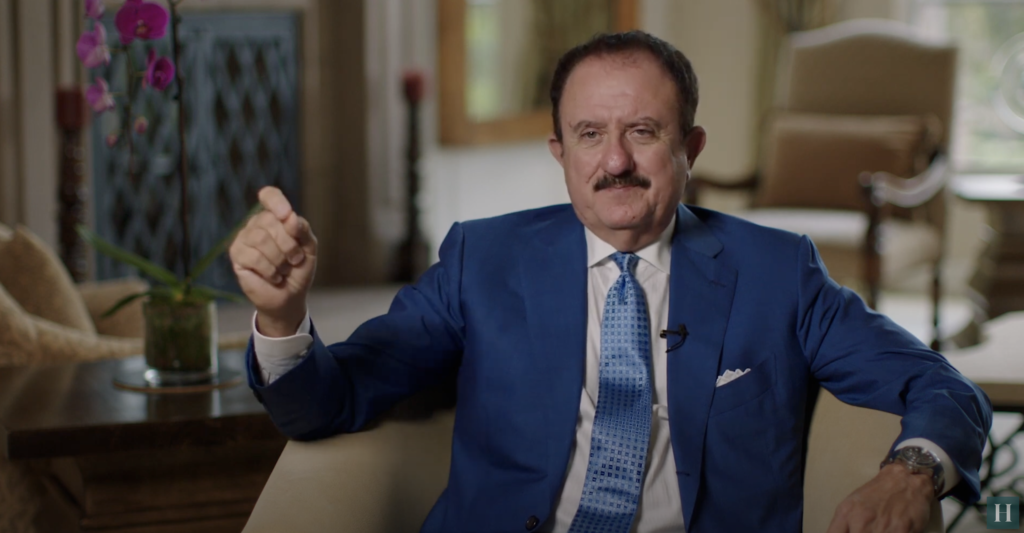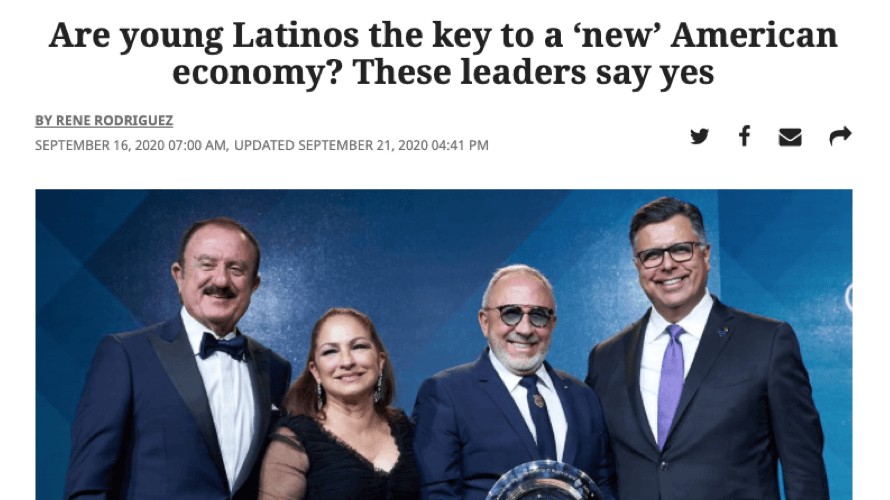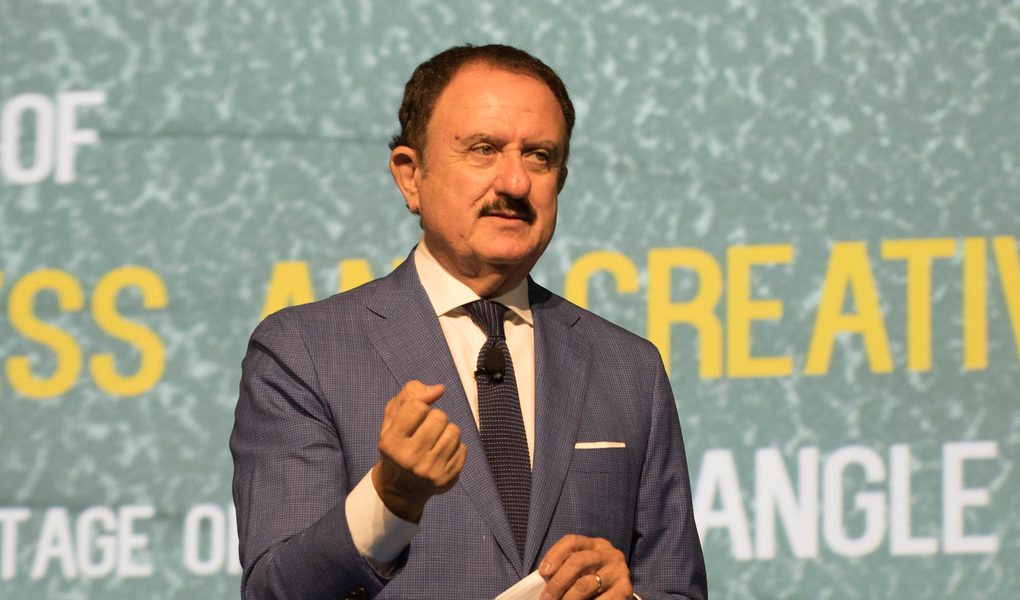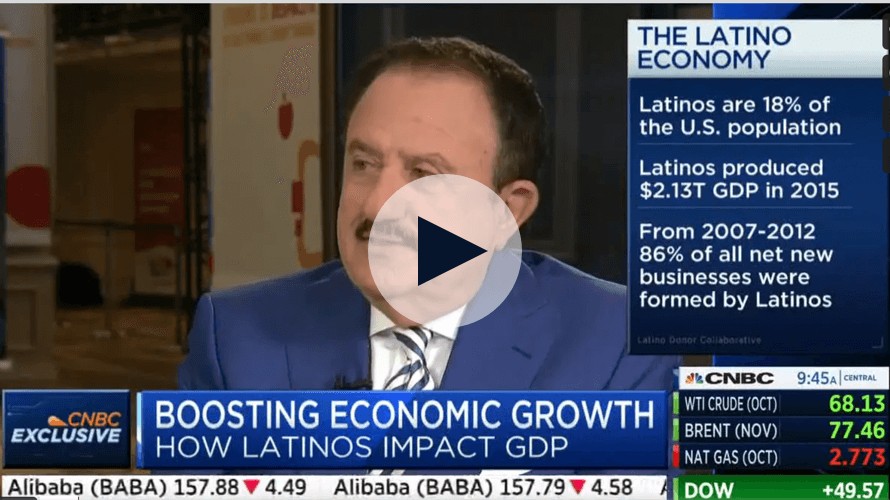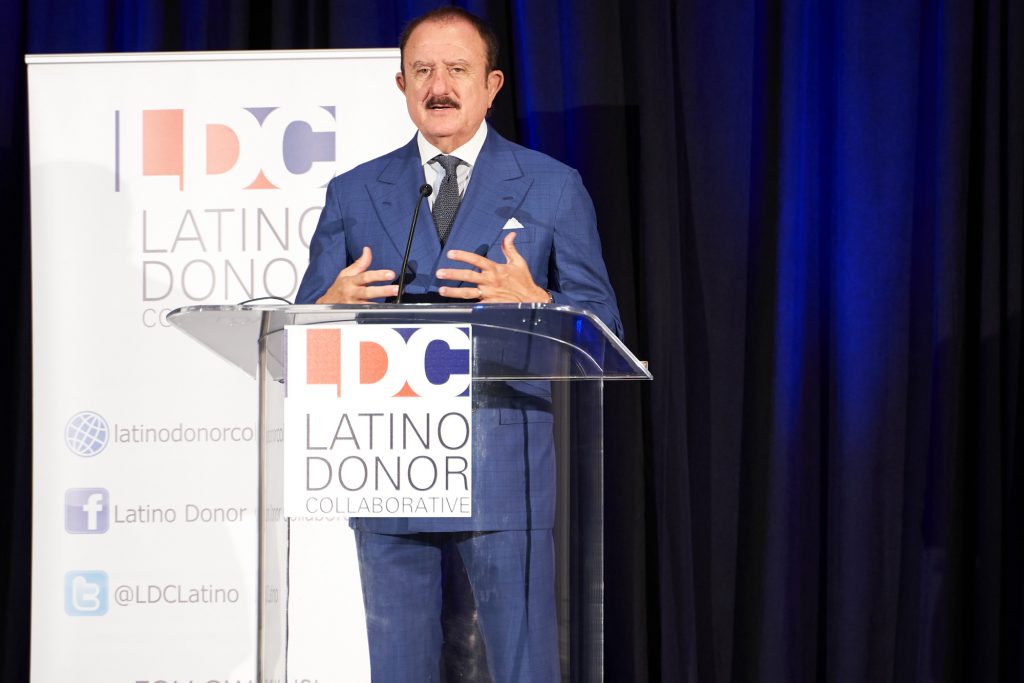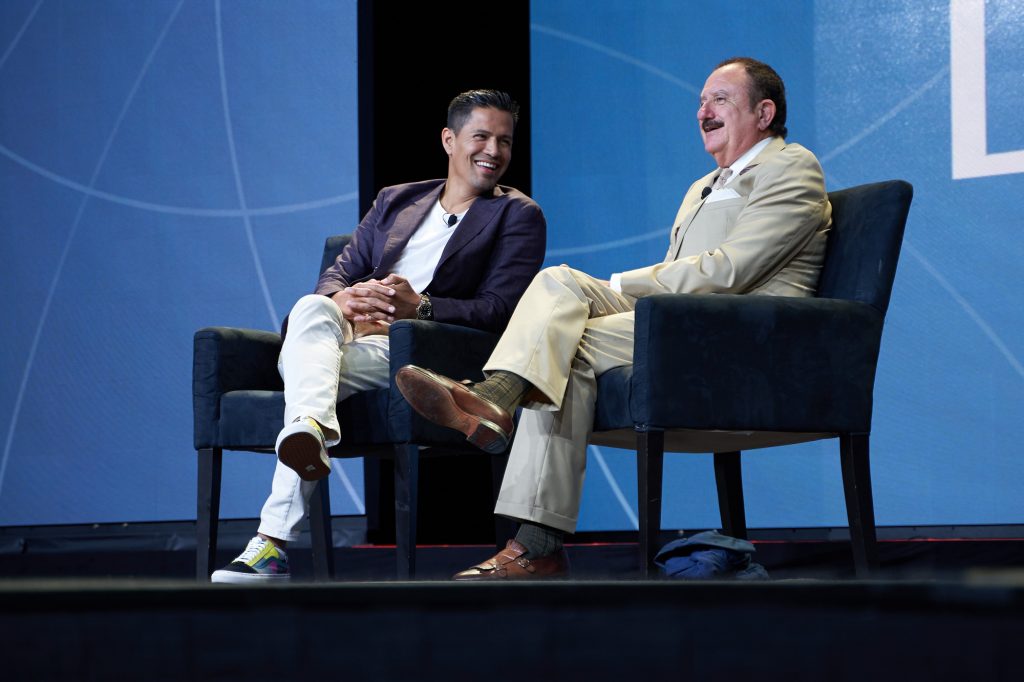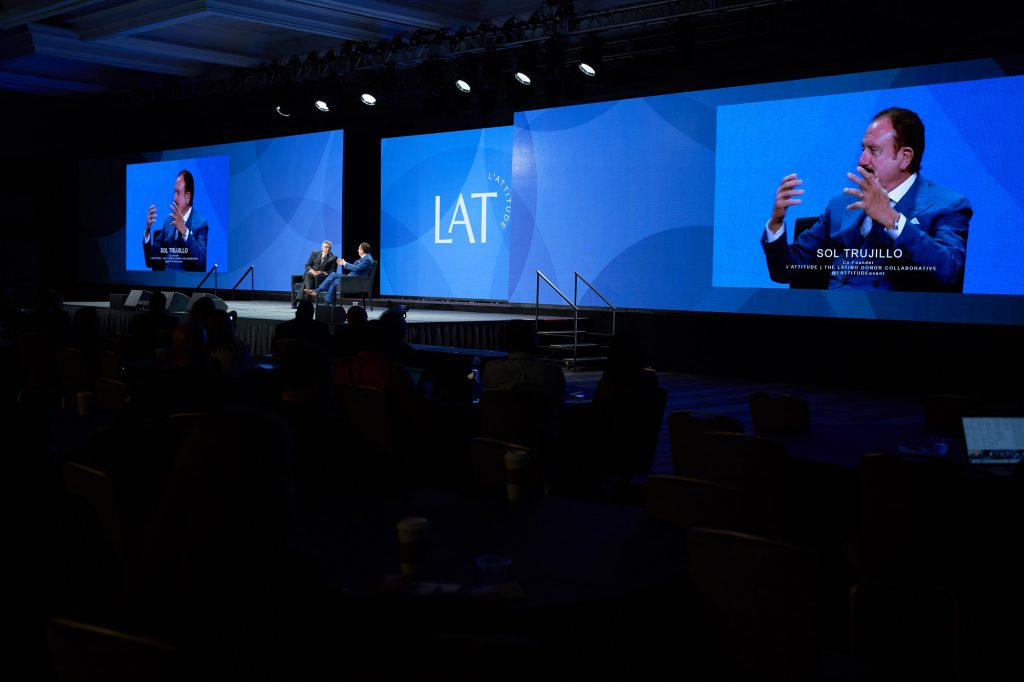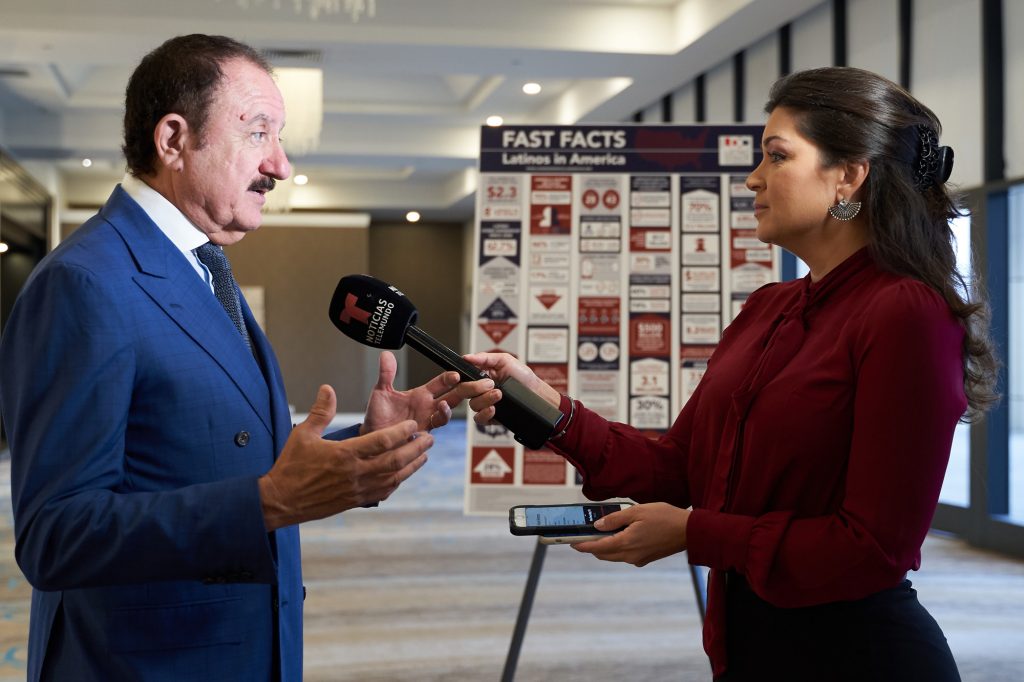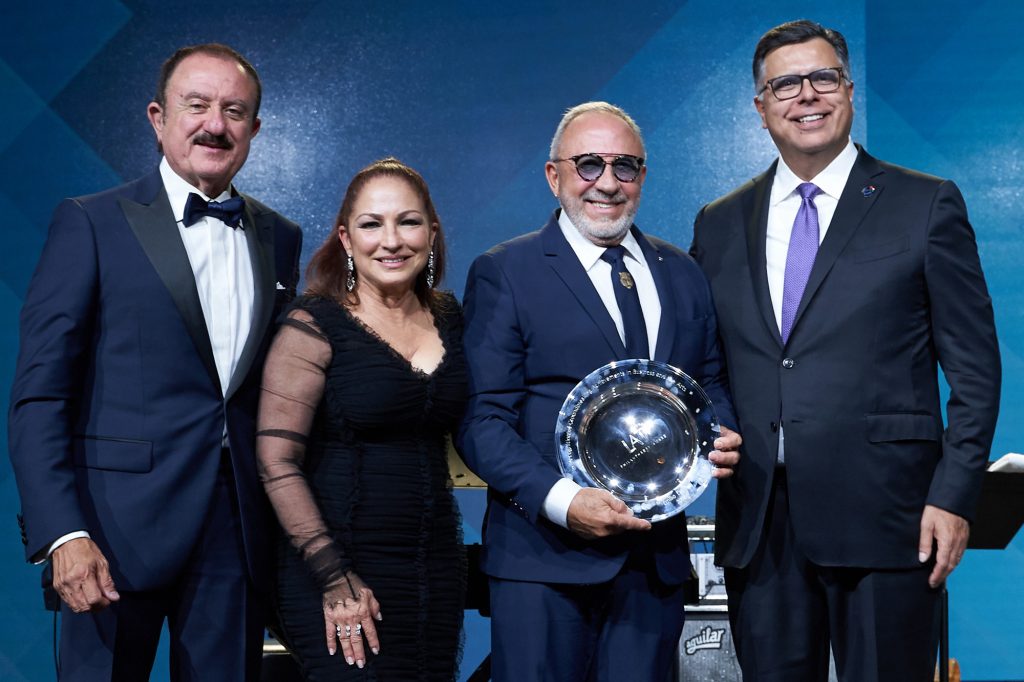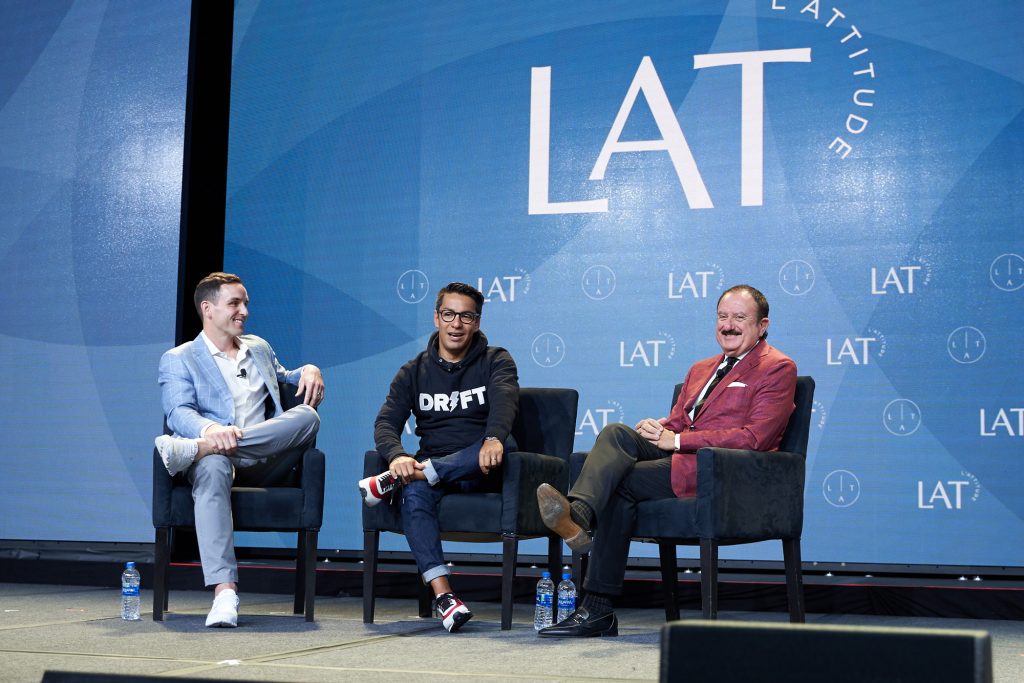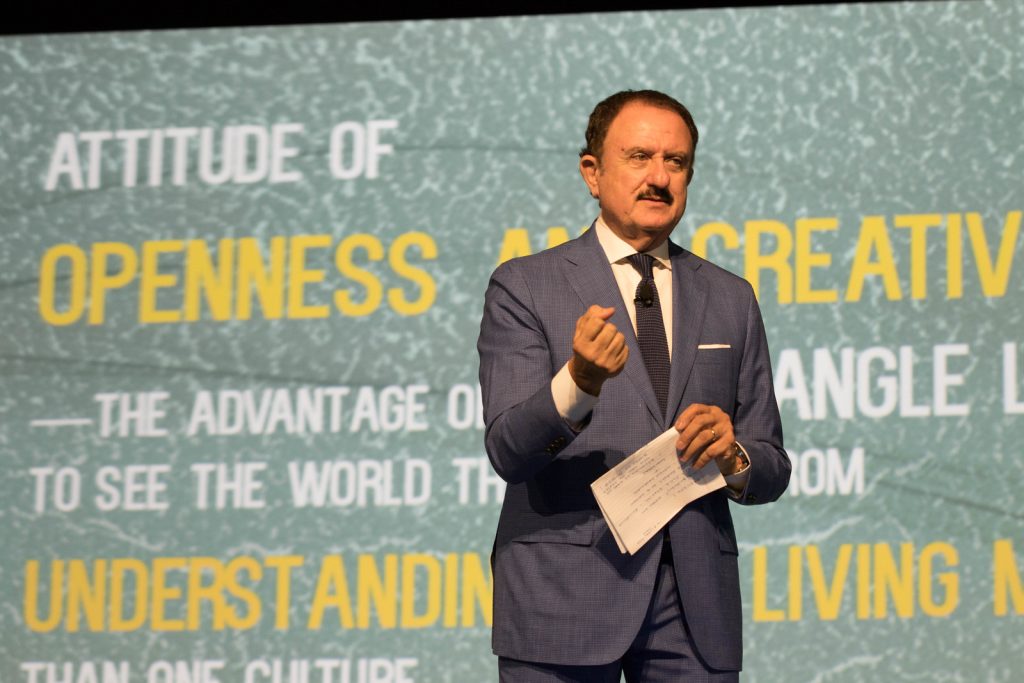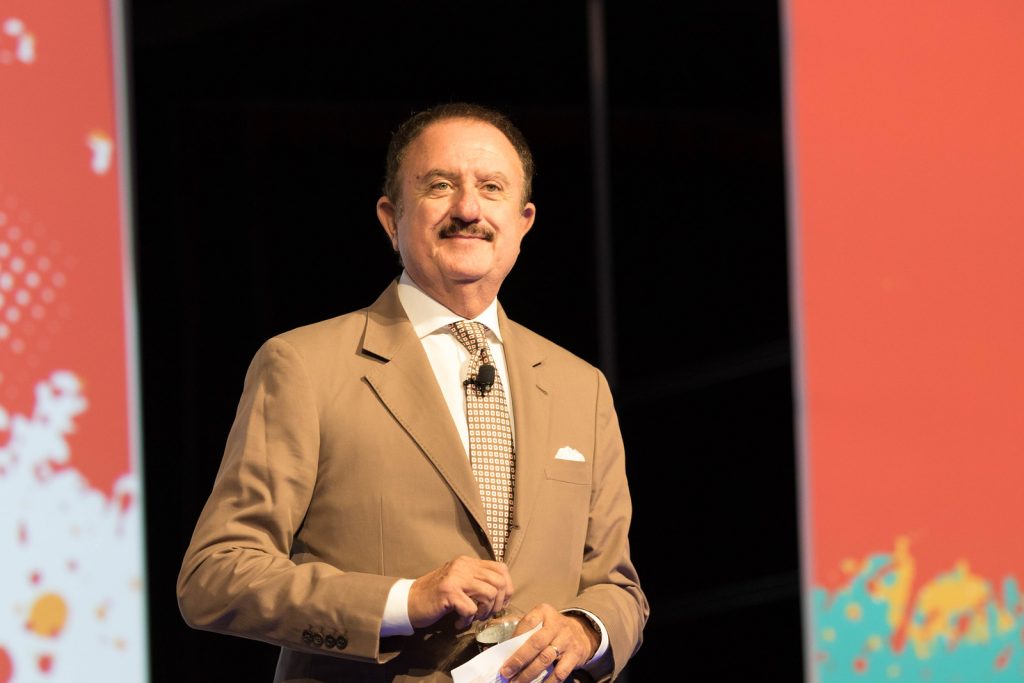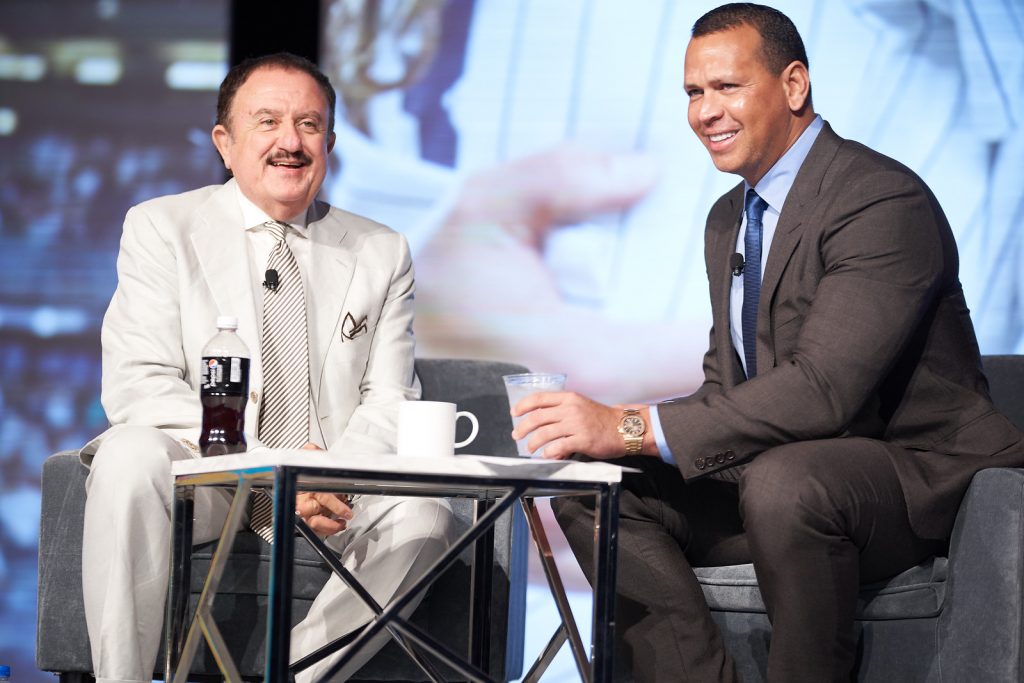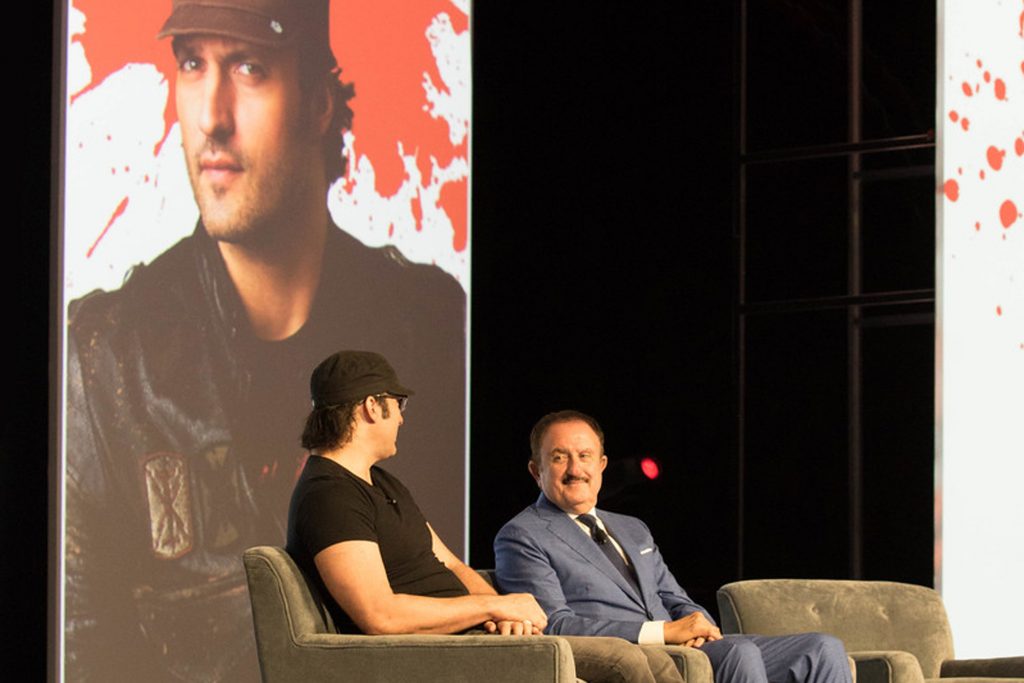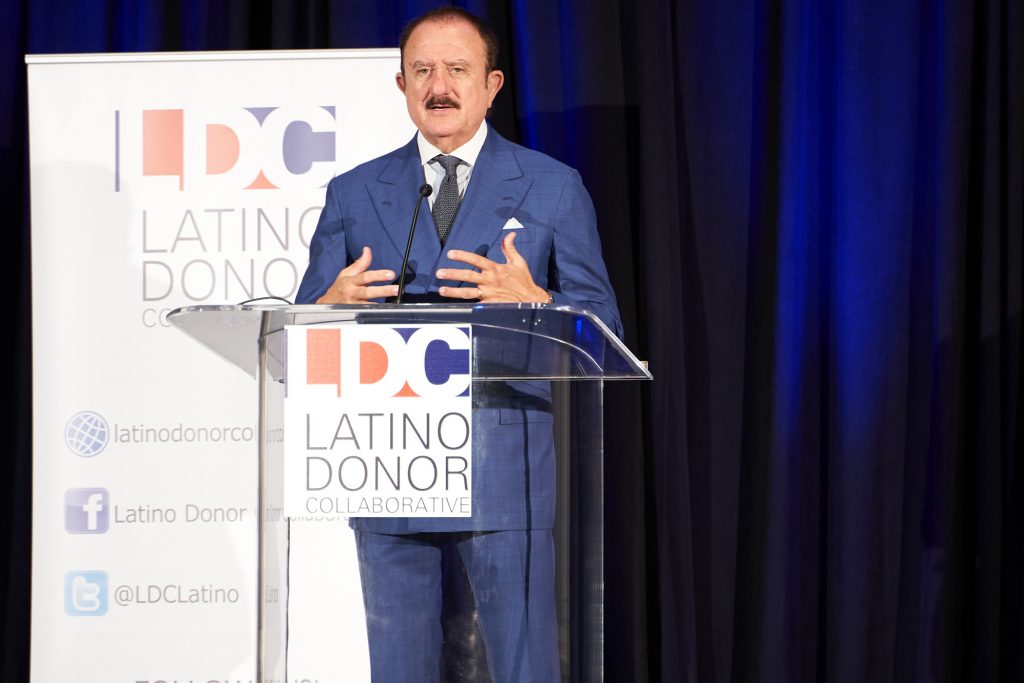Featured Interviews
IN THE NEWS
press media archive
-

December 15, 2022
Sol Trujillo Named In Bloomberg’s 100 Most Influential Latinos
He is a business executive of Latino descent who has served as CEO of global companies.
-
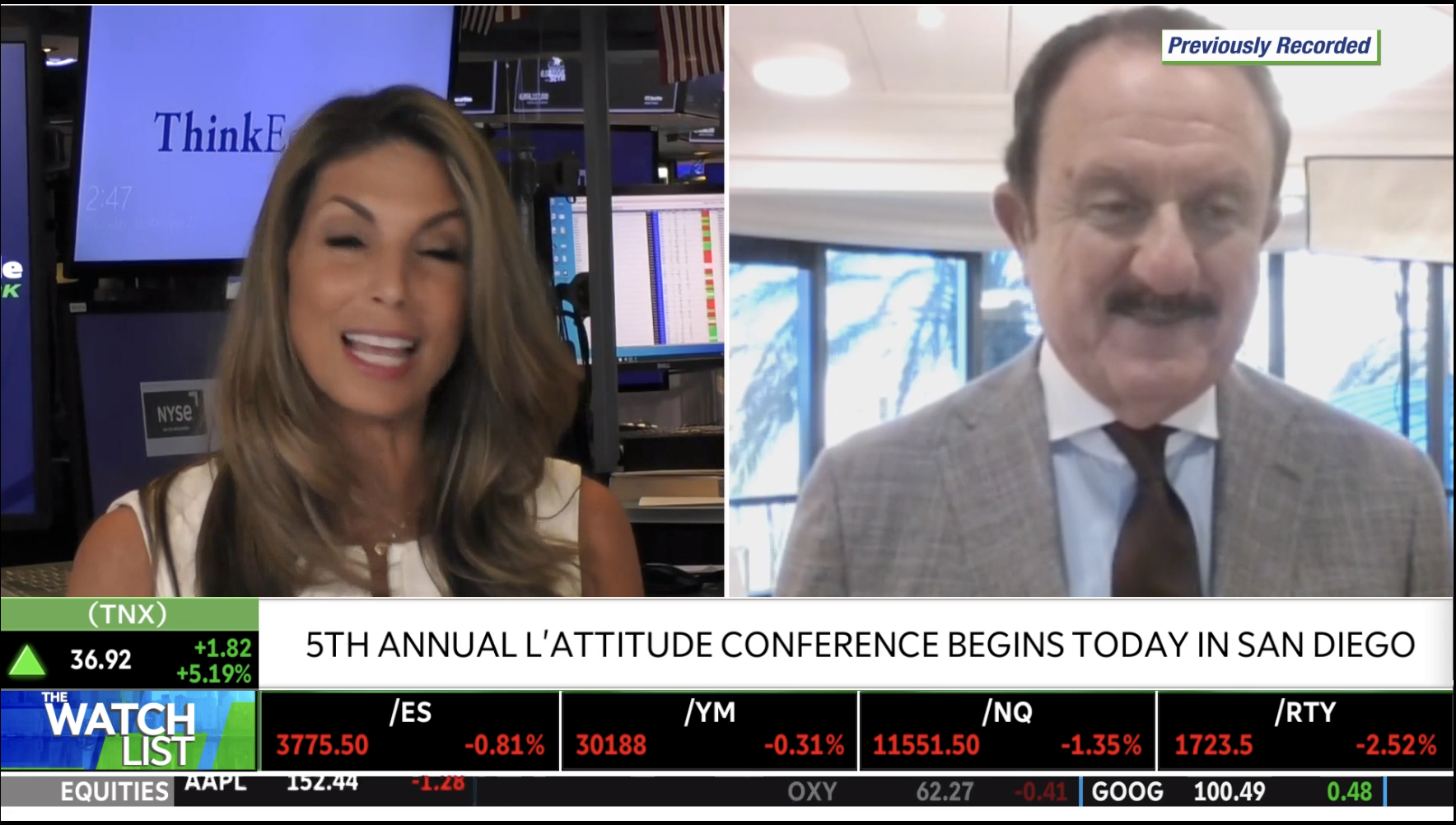
September 25, 2022
U.S. Latino GDP Is Fifth Largest In The World
If Latinos living in the U.S. were an independent country, the U.S. Latino GDP would be the fifth largest GDP in the world, larger than the GDPs of the United Kingdom, India, or France," says Sol Trujillo.
-

September 25, 2022
U.S. Latino economic output would rank 5th in world GDP, according to new study
“We’re talking about not just population growth and workforce growth, but also economic growth," said Sol Trujillo of the Latino Donor Collaborative.
-
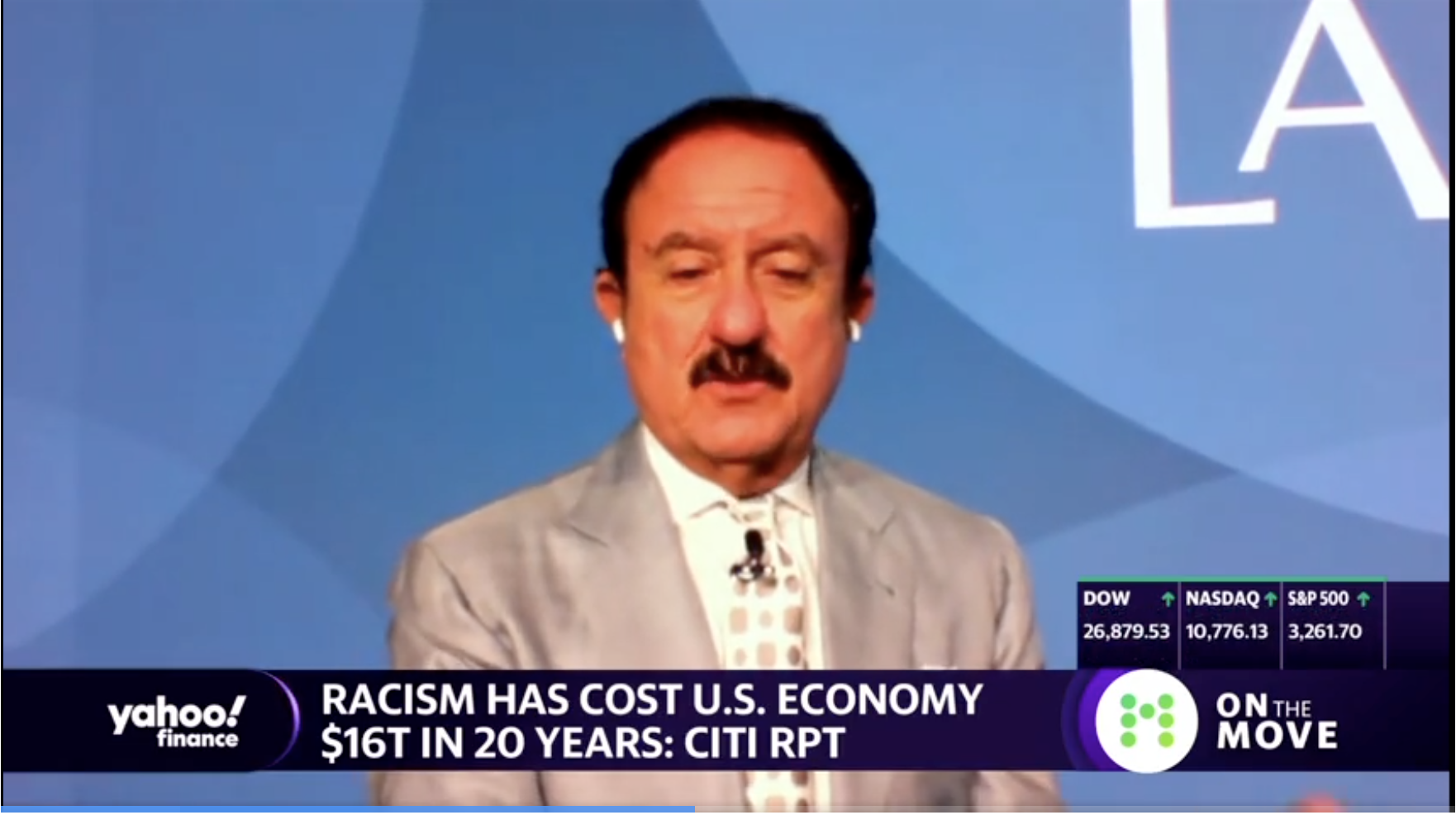
September 25, 2022
Latino-founded startups still have the ‘most difficult time’ raising capital, L’Attitude Ventures’ Sol Trujillo says
“It is the Latino entrepreneur that has the most difficult time of any cohort in the United States to access capital,” Sol Trujillo, founder and general partner of L’Attitude Ventures and chairman of Trujillo Group, told Yahoo Finance at the L’Attitude conference (video above).
-
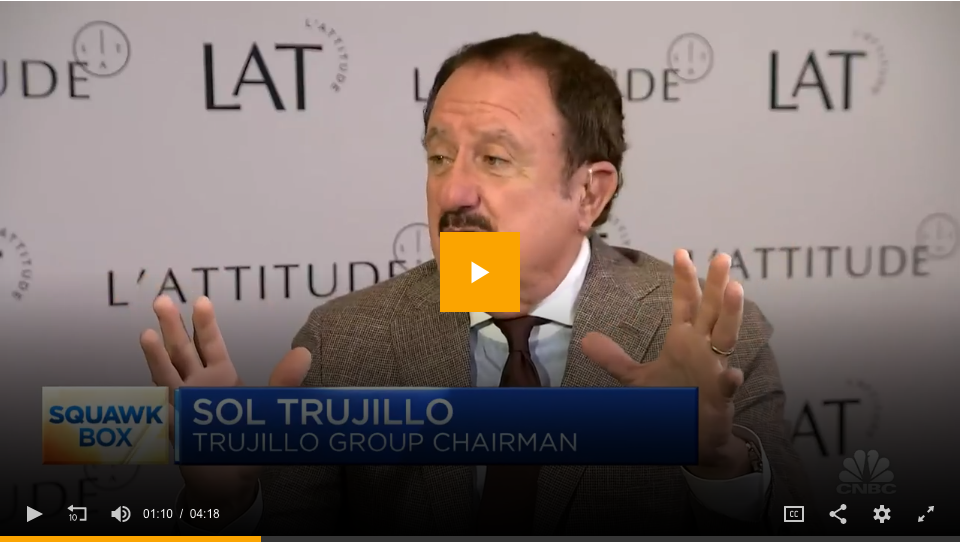
September 9, 2022
Latinos are the engine of growth in the U.S., says Sol Trujillo
Sol Trujillo, Trujillo Group Investments chairman, sits down with CNBC’s Joe Kernen at the L’Attitude Conference in San Diego to discuss the economic influence of Latinos in the U.S.
-
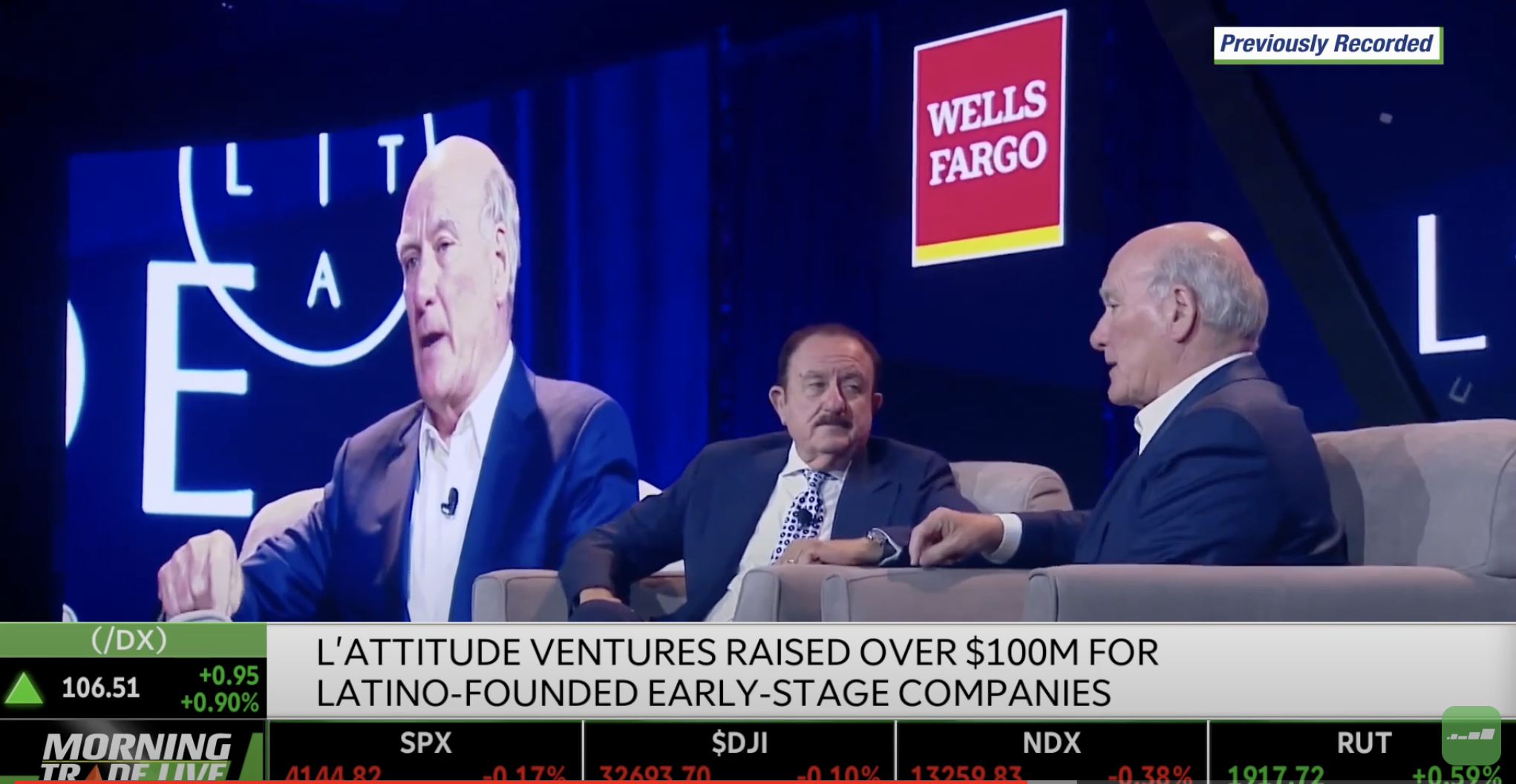
August 5, 2022
Introducing L’Attitude Ventures And How It’s Helping Early-Stage Latino-Owned Companies Evolve
LATTITUDE Event’s Sol Trujillo and former United Airlines CEO Oscar Munoz explain how funding from JPMorgan and Bank of America are helping L’ATTITUDE Ventures put early-stage Latin-owned companies on the map.
-

August 4, 2022
L’ATTITUDE Ventures’ Sol Trujillo on funding Latino entrepreneurs with help from JPMorgan Chase
“I’m a capitalist, so I believe capital should flow to where the growth is,” Trujillo says. His new fund will pour $100 million into Latino-owned startups.
-
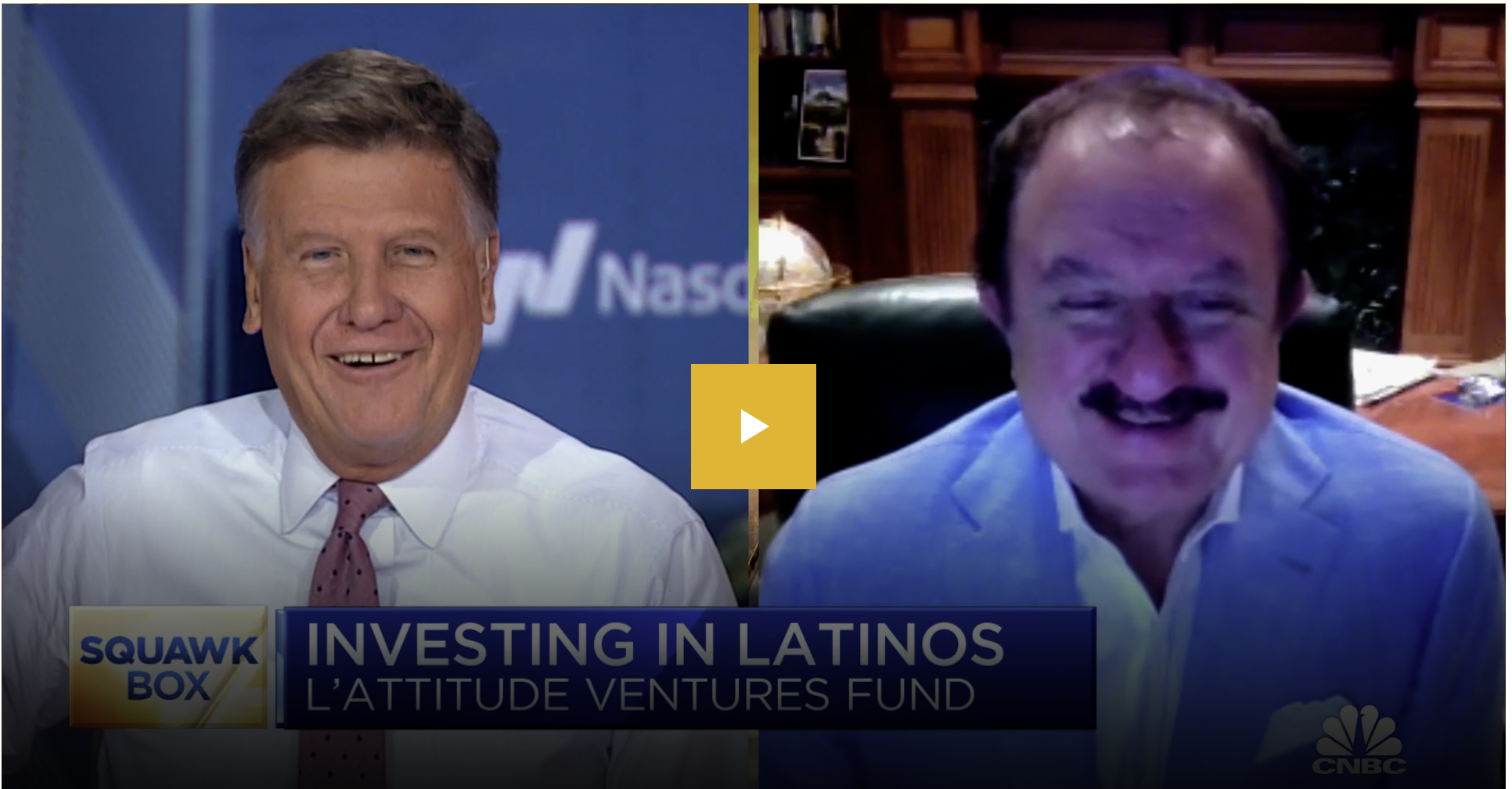
August 3, 2022
Latino-owned companies need readily available equity capital, says Sol Trujillo
Sol Trujillo, Trujillo Group Investments chairman, joins CNBC’s ‘Squawk Box’ to discuss investing in Latino-owned companies through his L’ATTITUDE Ventures Fund.
-

October 4, 2021
“Latinos are America’s engine of growth,” says L’ATTITUDE president
Sol Trujillo, cofundador de la organización, asegura que los latinos representan el 30% del crecimiento total del Producto Interno Bruto del país. Se estima que en los próximos 20 años, representarán el 70% de los nuevos compradores de bienes raíces.
-
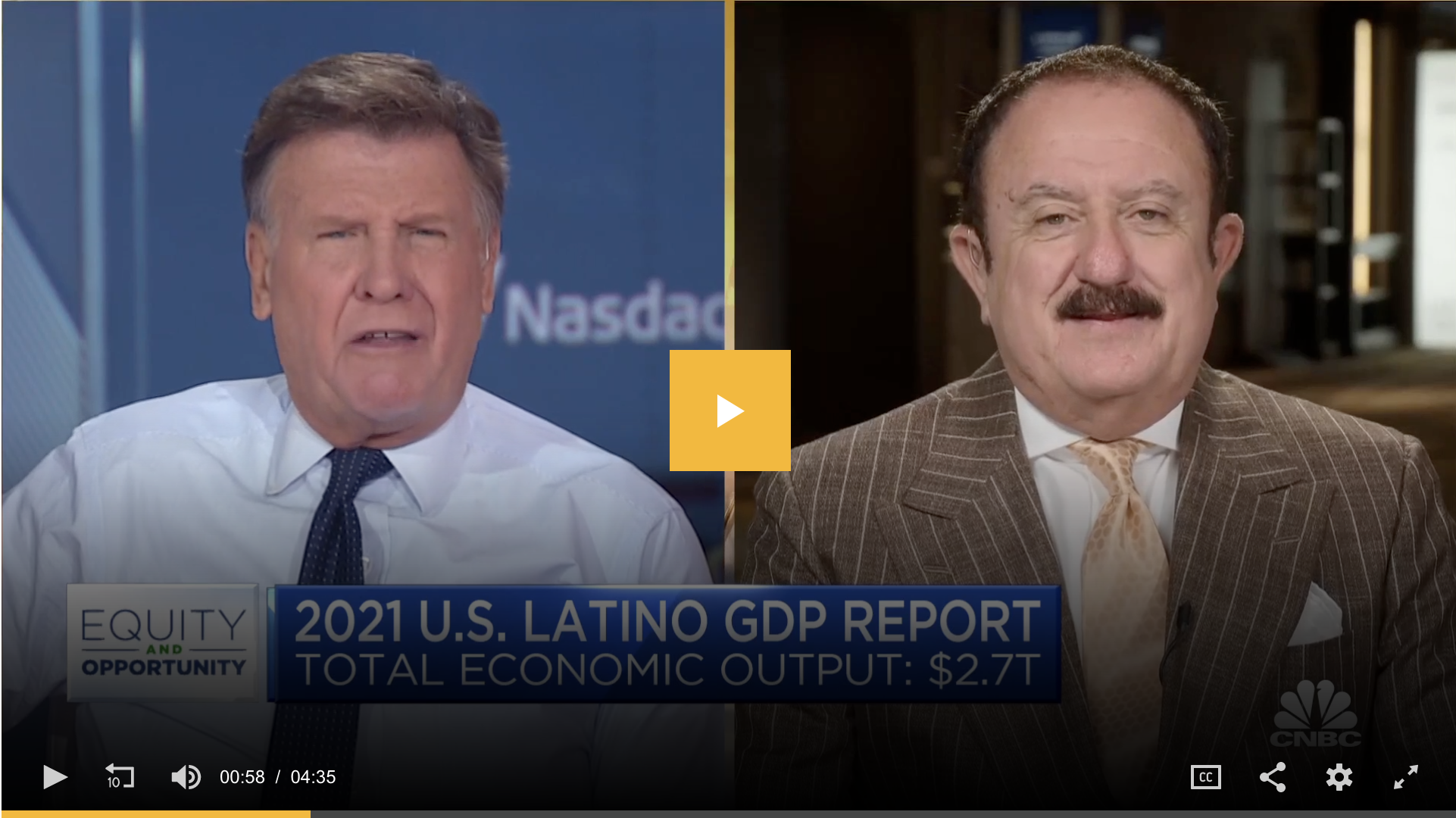
September 29, 2021
Latino U.S. economic output stands at $2.7 trillion: Report
CNBC’s “Squawk Box” discusses the latest findings from the 2021 U.S. Latino GDP report with the Latino Donor Collaborative’s Sol Trujillo.
-

September 14, 2021
Report finds U.S. Latinos have the world’s fifth-largest GDP
Sol Trujillo, co-founder and chair of Latino Donor Collaborative, comments on the economic impact of U.S. Latinos. "It's what differentiates the U.S. from other majority economies: we have a youthful cohort that's entrepreneurial, productive."
-

September 12, 2021
Nike CEO John Donahoe on How Serena Williams Changed the Swoosh and Improving Hispanic Representation
Yesterday, Nike Inc. president and CEO John Donahoe participated in a fireside chat during the American culture-focused media event L’Attitude, alongside its co-founder, Sol Trujillo. Throughout the discussion, Donahoe revealed Nike’s recent equity-focused efforts, including both external storytelling and internal initiatives, also addressing the company’s shortcomings.
-
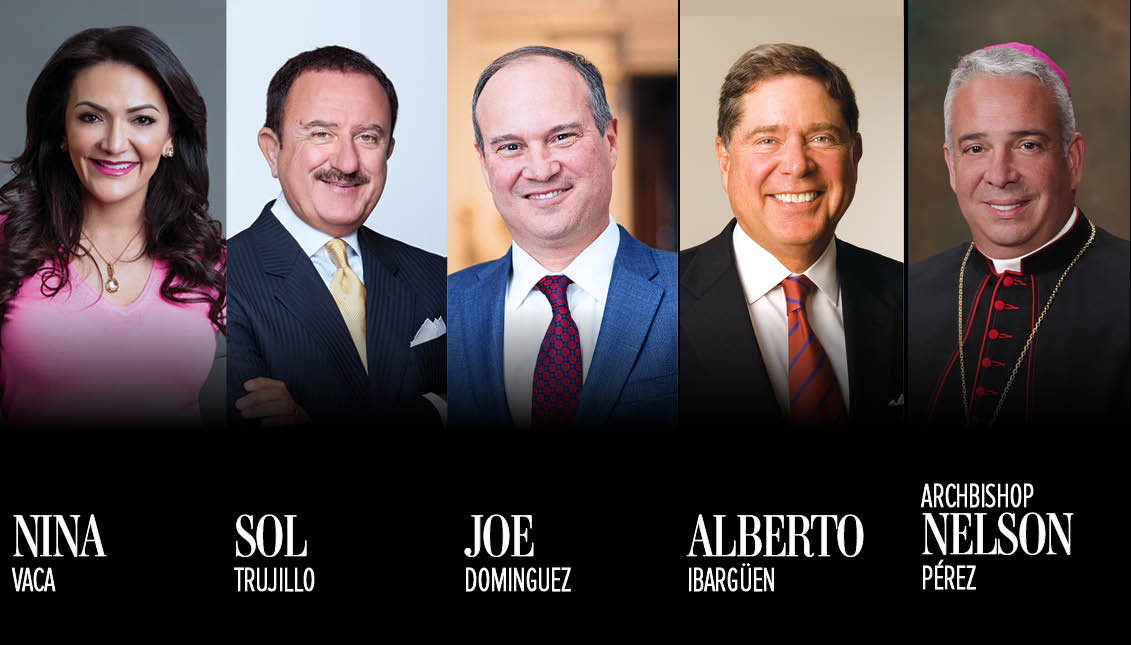
June 28, 2021
The 25 of the AL DÍA 25th Year Anniversary
Solomon Dennis "Sol" Trujillo is an American businessman, global media and technology executive.
-

May 1, 2021
HBO Max to Reboot Nickelodeon’s The Brothers Garcia
New Cadence Productions is rebooting Nickelodeon's The Brothers Garcia, which originally aired from 2000-2004, as The Garcias for HBO Max.
-
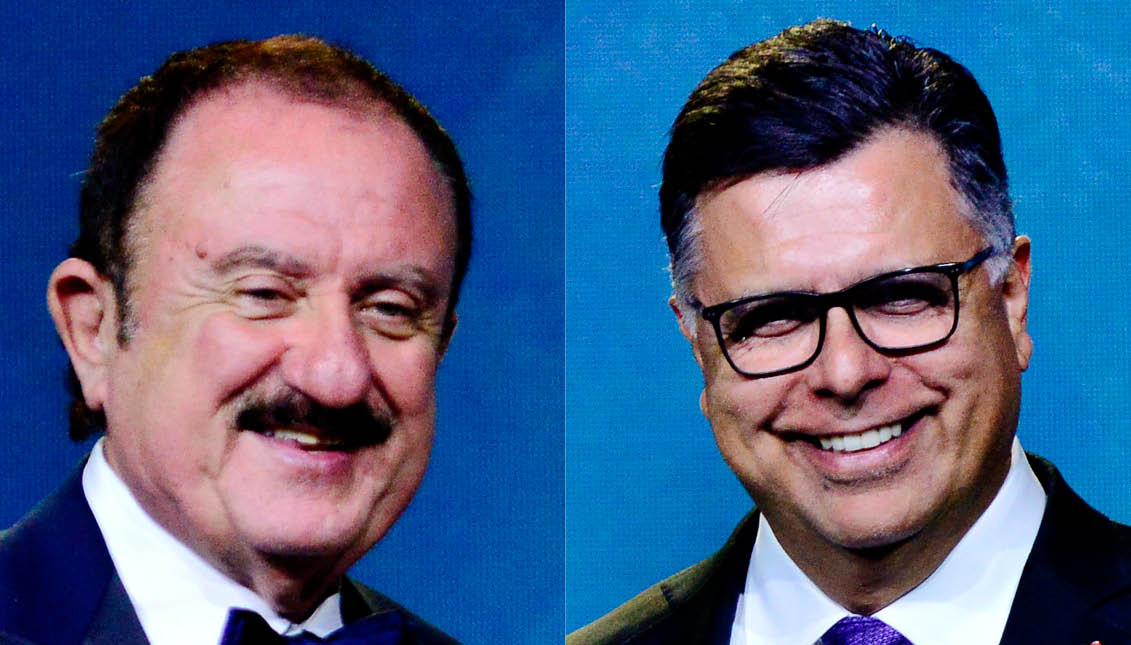
April 22, 2021
More Hispanics are now Owning a part of America
The President of the National Association of Hispanic Real Estate Professionals (NAHREP), Gary Acosta, was the guest of a new online series hosted by L'ATTITUDE's co-founder Sol Trujillo.
-
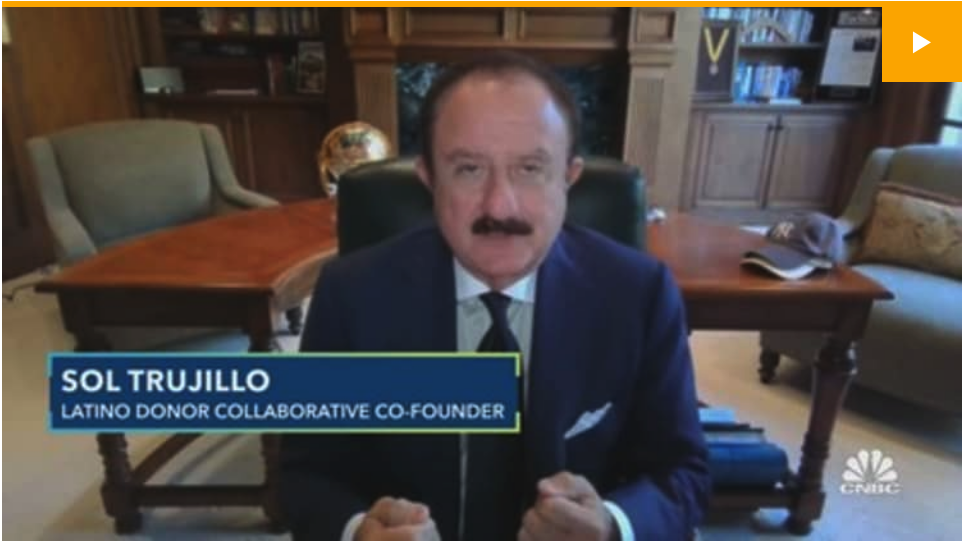
April 8, 2021
Sol Trujillo: Why math is central to financial literacy
Sol Trujilo’s love of baseball lead to love and math, a subject he considers the cornerstone of financial literacy.
-
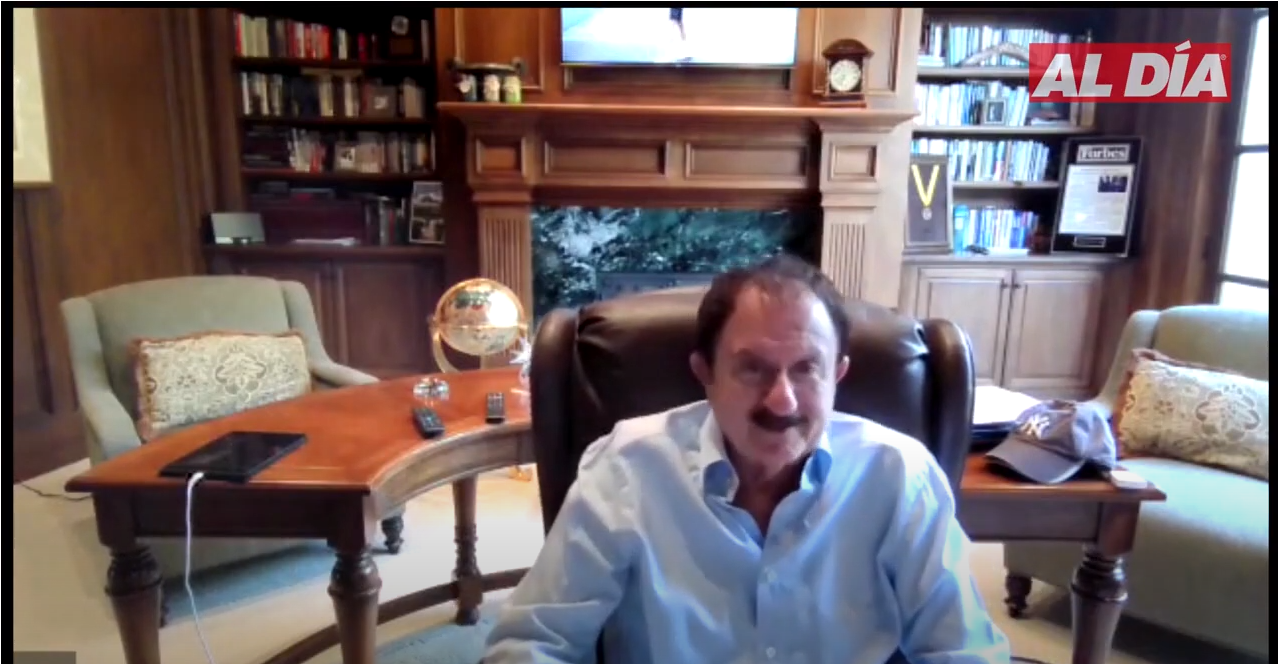
February 15, 2021
Sol Trujillo on his name and U.S. Latino history
Sol Trujillo, chair and co-founder of the Latino Donor Collaborative speaks with AL DÍA on his family history in the U.S.
-
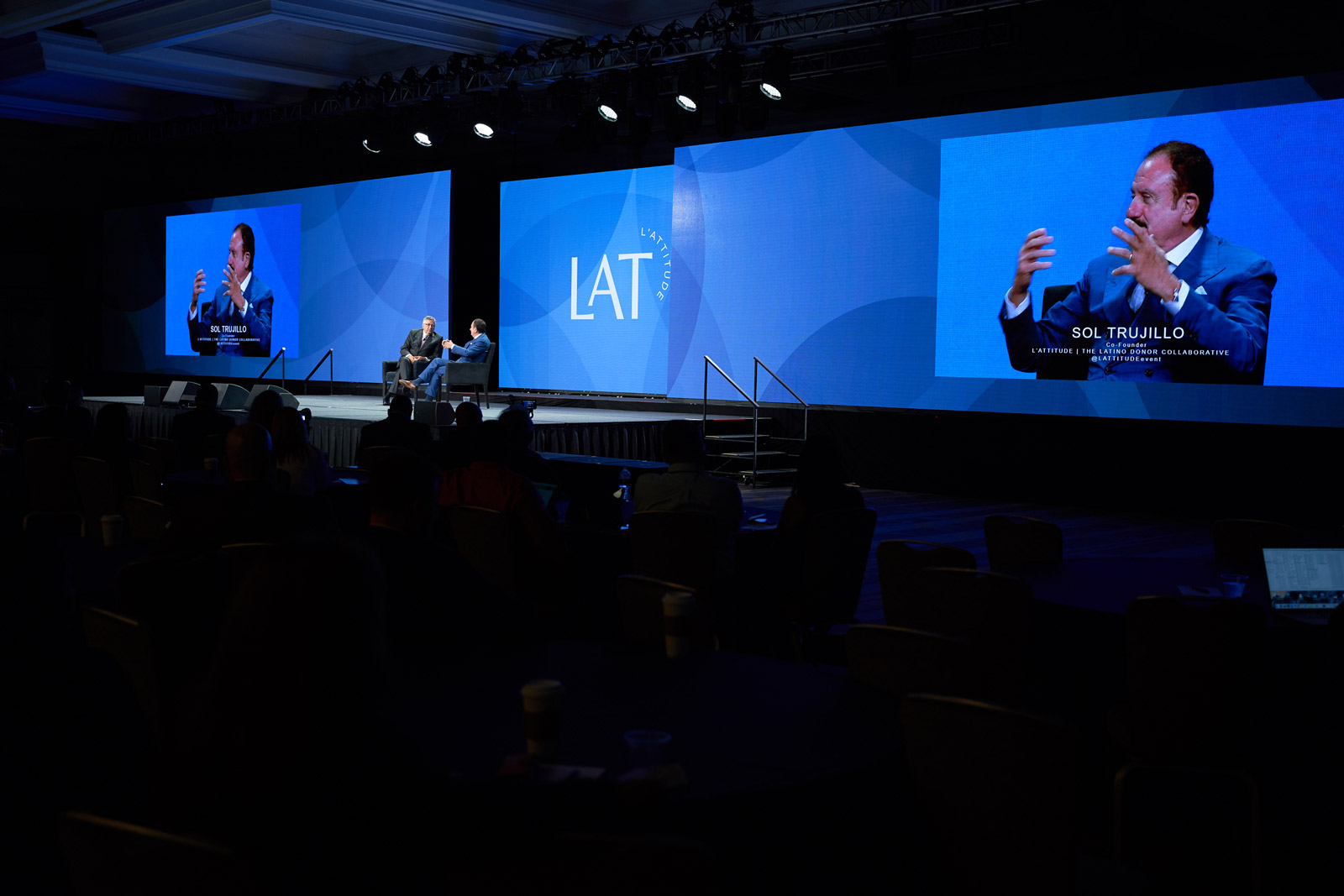
February 15, 2021
Sol Trujillo talks the new mainstream U.S. economy
Sol Trujillo, chair and co-founder of the Latino Donor Collective, tells AL DÍA about his vision for the new U.S. mainstream economy bolstered by Latinos.
-

February 15, 2021
Sol Trujillo on Latinos getting access to capital funding and L’ATTITUDE
Sol Trujillo, chair and co-founder of the Latino Donor Collective, tells AL DÍA about how more Latino entrepreneurs can get access to capital funding and the origins L'ATTITUDE.
-
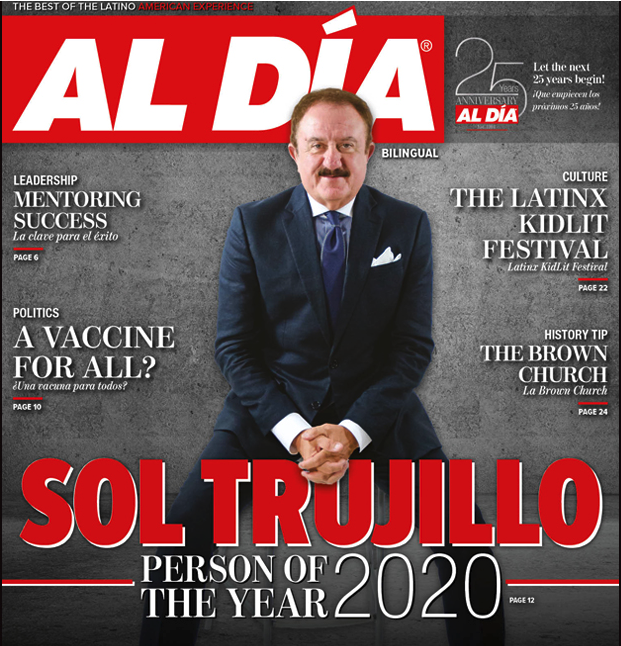
January 5, 2021
Why an “AL DIA Person of the Year”
A savvy and successful businessman, Trujillo is a different kind of Latino leader and activist.
-
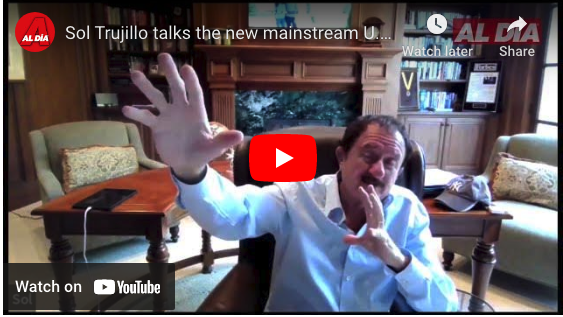
December 23, 2020
“Latinos Will Save The Economy”
A savvy and successful businessman, Trujillo is a different kind of Latino leader and activist.
-

December 2, 2020
Time will tell whether Telstra can become a leading digital company
The proposed restructuring of Telstra is an exciting new challenge for the company. It will now all depend on the direction the execution will take.
-
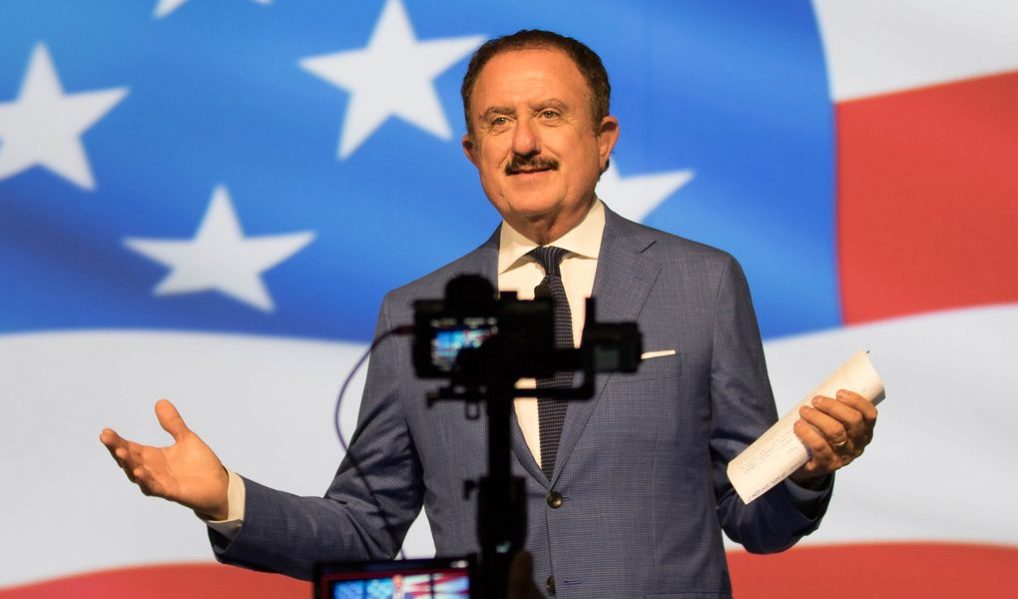
September 27, 2020
The $2.6 Trillion U.S. Latino Market: The Largest And Fastest Growing Blindspot Of The American Economy
The U.S. Latino market is “growing GDP at 8.6%, faster than China, faster than India, and nobody talks about it,” said Sol Trujillo, Co-Founder of L’Attitude, to a panel of world-renowned journalists and economists.
-
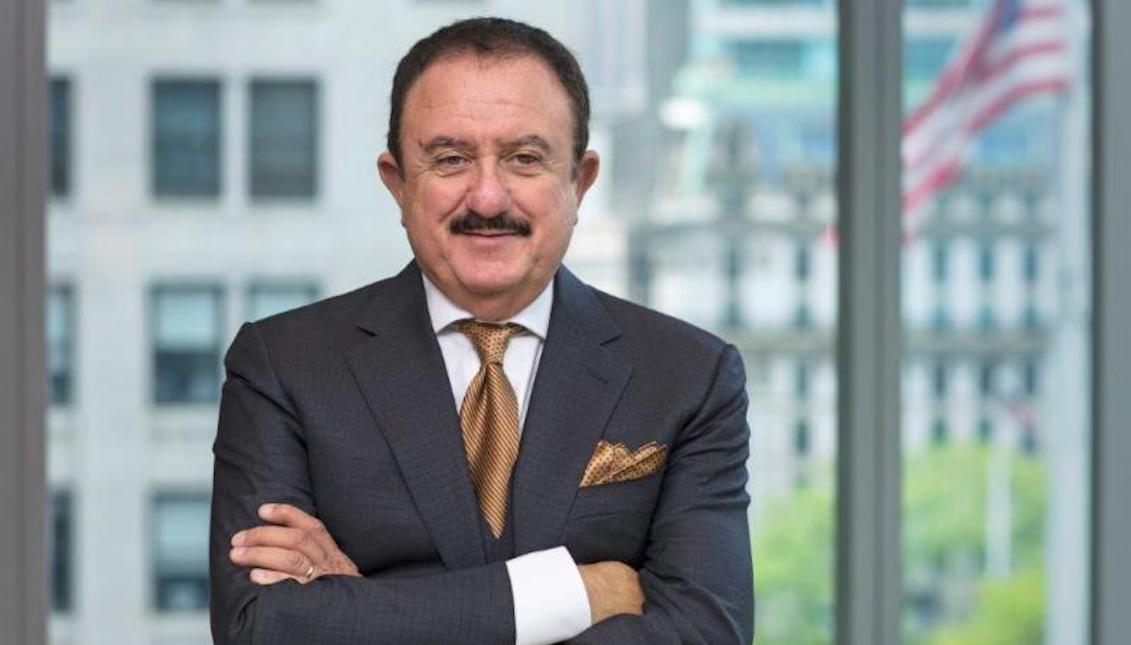
September 27, 2020
Sol Trujillo’s Untold Story of the American Economy
Solomon D. Trujillo wants to tell you a story. He calls it the untold story of the American economy, and he believes the main characters in this story are and should be U.S. Latinos.
-
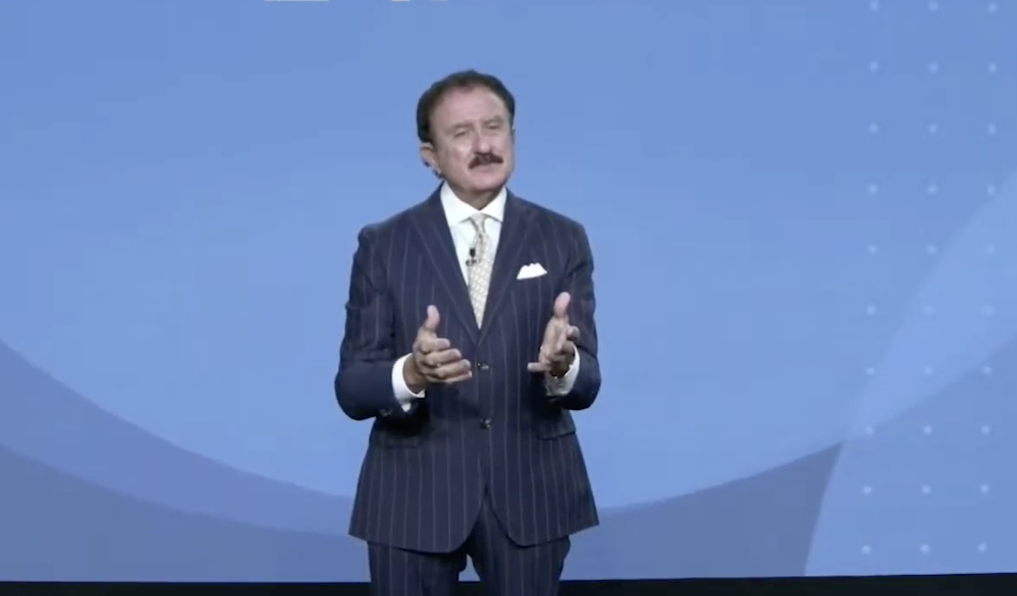
September 25, 2020
Why Latinos will jump-start the economy
Latinos are resilient and consistently demonstrate a strong work ethic, said Sol Trujillo, one of the founders of L’Attitude and the Latino Donor Collaborative, the nonprofit organization that produced the GDP report.
-
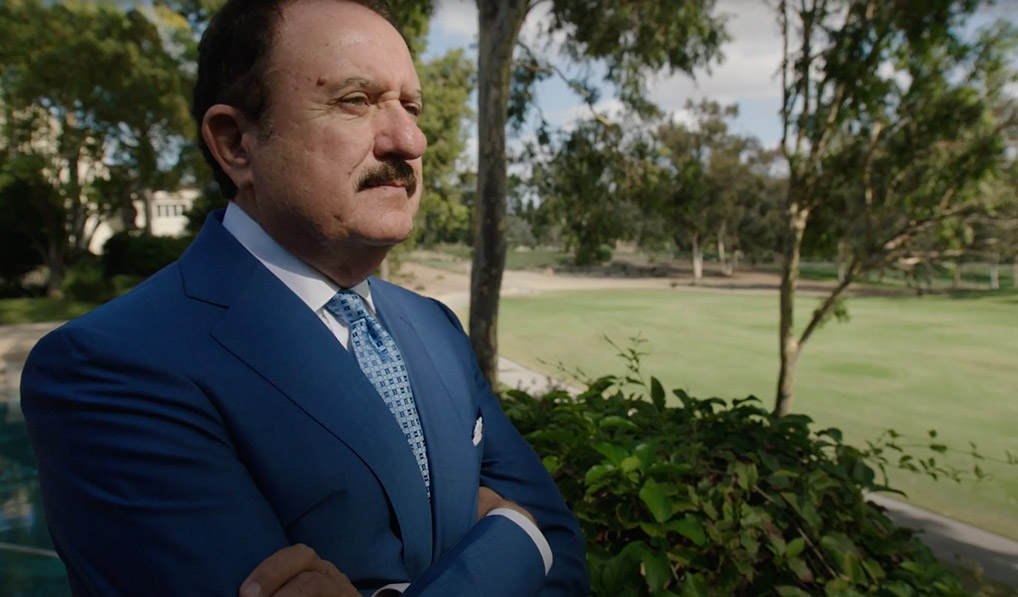
September 25, 2020
Sol Trujillo Discusses Latino Economic Considerations ahead of the Election
L’ATTITUDE Co-Founder, Sol Trujillo, discusses the current state and V-shaped recovery of the US Latino cohort amid the COVID-19 pandemic as well as considerations for Latino voters ahead of the US presidential election.
-

September 25, 2020
Execute to Deliver
Management today is largely about making things happen – which includes anticipating and taking advantage of change wherever it occurs – e.g., changing consumer tastes, changing technologies, changing competitive environments, changing internal dynamics. It is important to have institutional mechanisms and practices that can help you anticipate change and to be ready when the change occurs. Execution is also about making the right things happen – and that is about leadership. A leader is not unlike a chef who cooks a meal. Consider a situation where a chef and I shop at the same grocery or farmers’ market. We both buy the same ingredients: lettuce, celery, onions, tomatoes, lemons, chicken breast, bacon, cheese, etc. When we get back to our kitchens, the chef and I are free to follow our own taste in what we cook. I can assure you that even with exactly the same ingredients, the meal that I prepare will be very different from what the chef creates. The leader of an organization makes a difference in what is achieved – just as different chefs working with the same ingredients will produce different outcomes. Success is not about the ingredients or the technology, it is about how a team executes with those basic ingredients. In the media-comms space where I have worked, everyone has DSL, 3G, LTE, fiber-optics, and related technologies. Execution is about results and the ability to execute to good results will reflect the vision, knowledge, leadership skills, and temperament of the leader – whether it is the CEO or the project leader. Examples of executing to deliver include: At USWEST, Orange and Telstra we used real-time market-based management to segment and serve discrete markets segments with products and services tailored to particular needs of each segment. At Telstra we established a product development unit led by a senior executive to increase our speed-to-market ability. At Orange and Telstra we reformed procurement processes to achieve more responsive relationships, better prices, and faster turnaround. At US West, Orange, and Telstra we were first-to-market in many areas – including TV over copper wires, digital directories, DSL deployment (US West), smart phones (Orange), and a world-leading, nationwide, high-speed mobile Internet (Telstra).
-
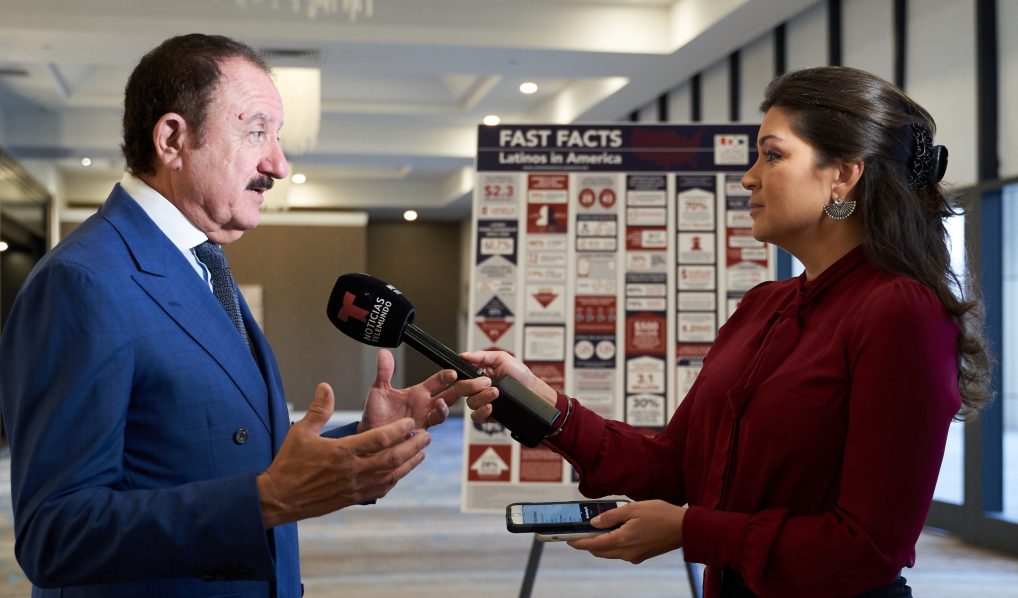
September 24, 2020
Sol Trujillo on the Economic Influence and Contribution of the US Latino Cohort.
The positive economic impact of US Latinos is growing rapidly. L’ATTITUDE co-founder and economic expert Sol Trujillo joins CNBC’s Squawk Box to discuss the best path forward, including greater Latino representation on US corporate boards.
-
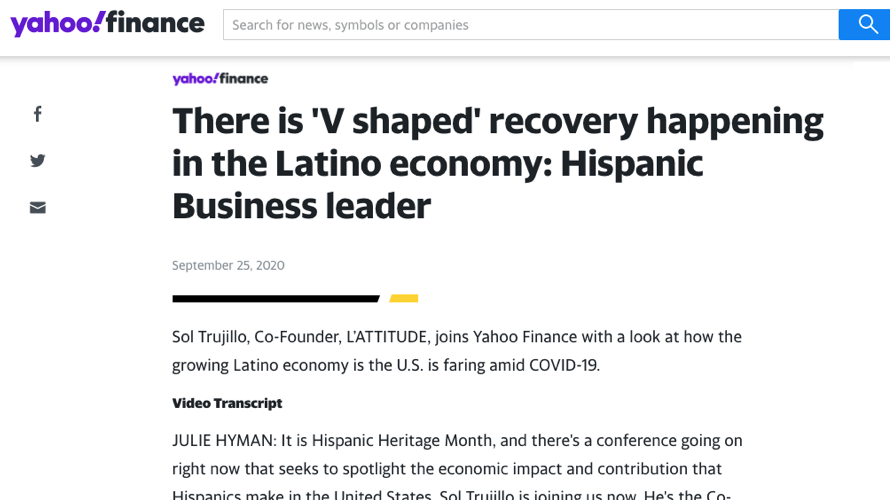
September 24, 2020
Sol Trujillo on the Economic Influence and Contribution of the US Latino Cohort.
A new report details the growing economic contributions of Latinos living in the United States. Sol Trujillo, co-chairman of Trujillo Group Investments and co-founder of L’ATTITUDE, joins “Squawk Box” to break down the numbers.
-
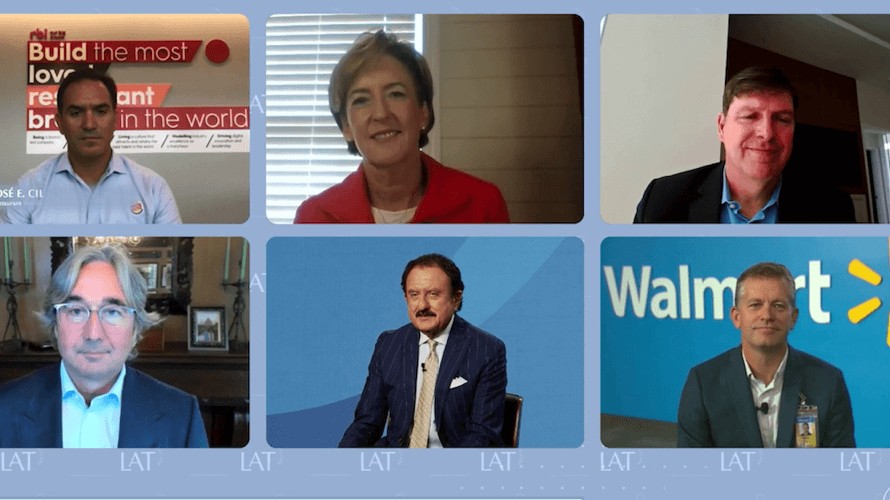
September 24, 2020
Verizon CEO Discusses the Impact of Latino Community at L’ATTITUDE 2020
-
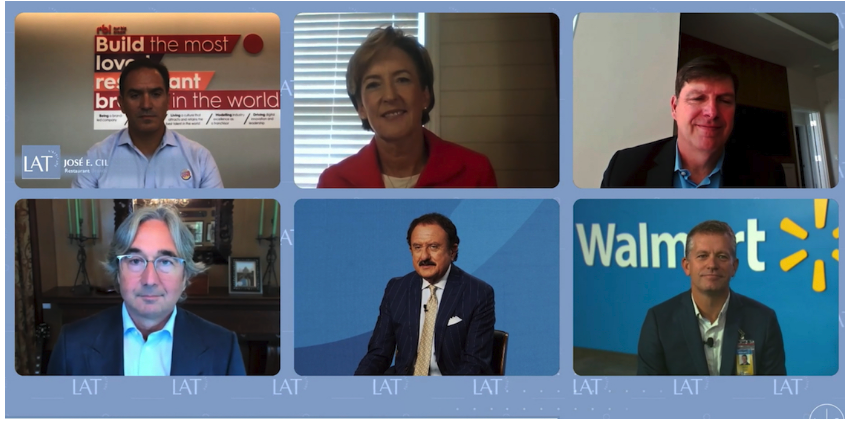
September 24, 2020
A CEO who gets it: Hispanics Key to Future Growth
Hans Vestberg is a man who knows something about diversity, having served on three continents and speaking five languages. He sees explosive growth coming for American Hispanics.
-
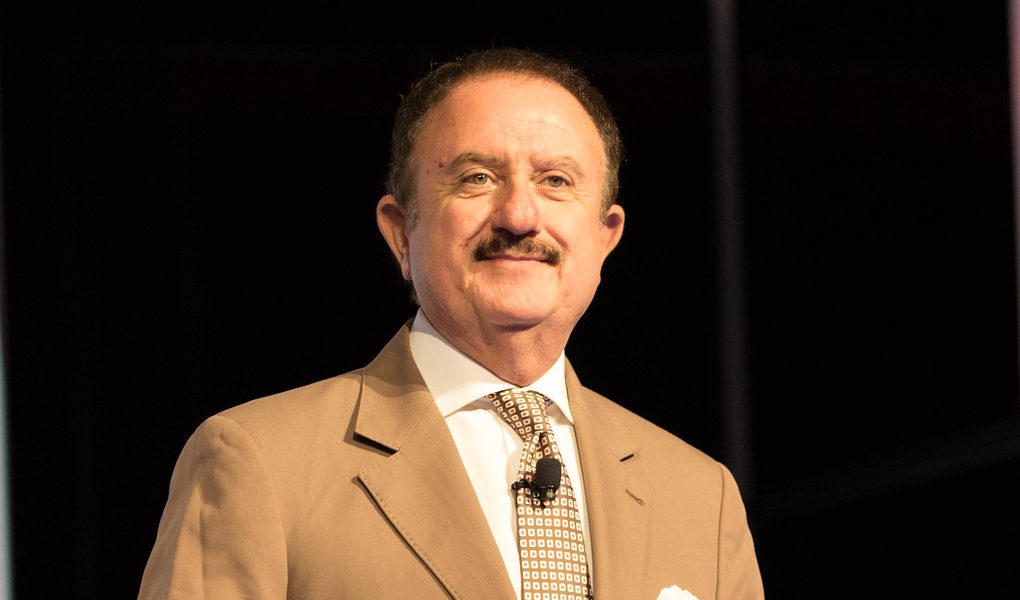
September 23, 2020
CNBC Squawk Box Interview with Sol Trujillo 2020
Sol Trujillo talks about the the Latino impact on GDP.
-

September 21, 2020
Win Through Diversity
I spent most of my early years in a region of the US that has significant minority populations –especially Native Americans and Latinos. I learned early that diversity in the market place requires companies to have employees that look like and think like their markets. That means more diversity – racial, ethnic, gender, and age – in the ranks at every level, but especially of leadership teams and customer-facing staff. It also means that market realities and business imperatives are raising the bar beyond legal requirements to ensure equal opportunity – even in nations that don’t have formal affirmative action programs. A Fortune article more than a decade ago entitled “50 Best Companies for Asians, Blacks and Hispanics,” (July 19, 1999) named US West one of the top 15 companies in the nation for minority employees. I noted in that article that “We are in a very labor-short environment, and a company that has a reputation as valuing all people does have an advantage.” Shortly after receiving the Fortune honors, Latina Style magazine named US West the best company in the nation for Latina employees. JoLynne Whiting is a senior executive in marketing with whom I have worked for many years – including senior posts she held at US West and Telstra. JoLynne is a talented and effective executive who has helped me over the years to advance diversity at every level in the business organizations we led. JoLynne once wrote, “As the world becomes flatter, smaller, and smarter, markets are becoming more diverse. Global markets are, by definition, more diverse, but so are domestic markets, as global competition and global migrations reach record levels.” Affirmative action laws and regulations require US executives to promote diversity. But diversity is not only about laws and regulations. Diversity is also about good business – competing to win in markets that are defined by racial, ethnic, gender, and age diversity. Diversity is also about what is right – such as providing equal opportunity to everyone, to make societies stronger even as we also make our enterprises stronger. CEOs, senior leaders, and even project managers working in countries that do not have affirmative action requirements would be well advised to develop equal opportunity imperatives to guide decision-making in employee recruitment, training, promotion, and retention. In Australia, for example, there are no affirmative action requirements, but while I was CEO of Telstra we initiated management programs to achieve more diversity in our employee ranks right up to the composition of the senior team, especially in providing opportunities for women and people with Aboriginal backgrounds.
-
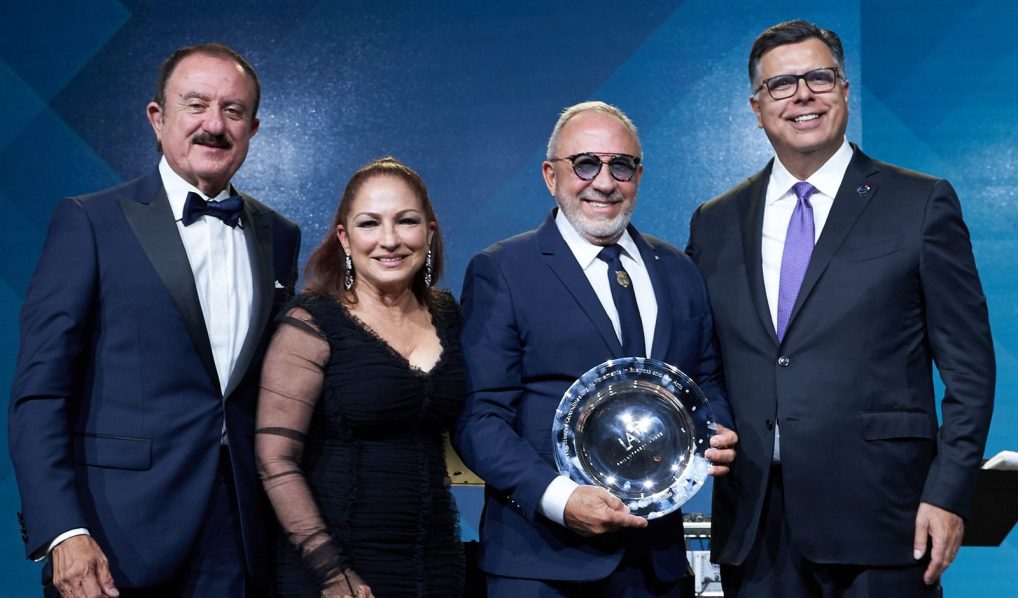
September 16, 2020
The Latino Cohort Holds the Keys to the New Mainstream Economy
L'ATTITUDE co-founder Sol Trujillo, Nike CEO John Donahoe, and other influential leaders relate the importance of diversity and inclusion for businesses to succeed in the United States over the coming decades.
-
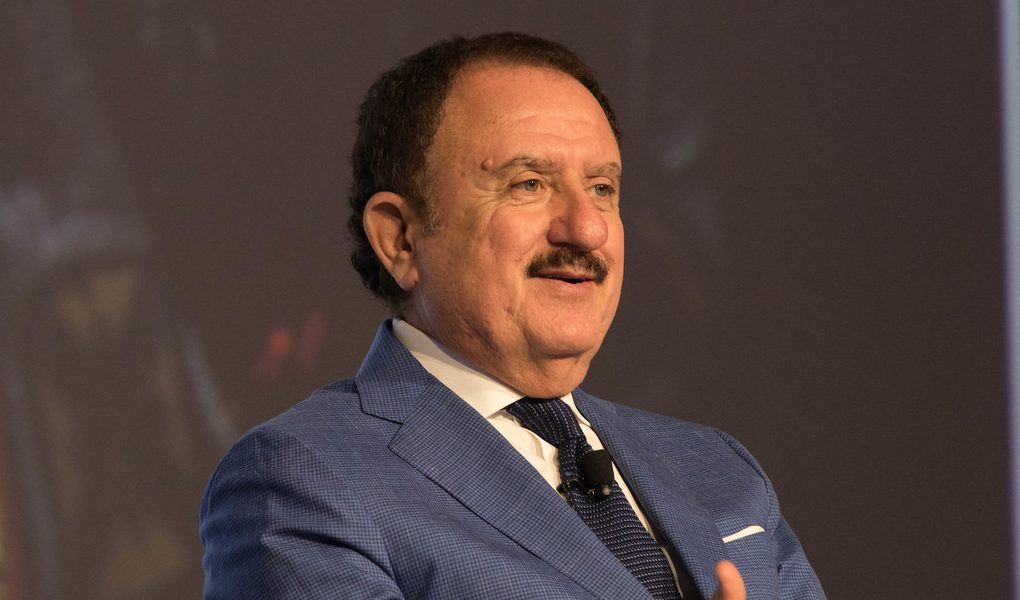
September 15, 2020
The Dynamic Story Of America’s Booming Latino Population: Sol Trujillo
As he tells Steve on the latest episode of “What’s Ahead,” Trujillo points out the economic growth potential for the Latino community and details the common-sense reforms that Trujillo says are needed in our immigration system to unlock the true potential of this community for the benefit of us all.
-

September 14, 2020
Set World-Class Standards
It is essential to seek high performance at every level, in every team, and in every system. It is not enough to want to be good. You need to want to be the best. When you set goals that seem impossible to achieve, you will often achieve them. That’s what happened when President John F. Kennedy set the goal in 1961 that Americans would put a man on the moon by the end of the decade. No one knew how we would do that, but everyone from the scientists and engineers to the program managers had a clear goal – and they reached it on July 20, 1969. If you set the bar too low, people are not motivated and not excited. Some examples of our world-class goals include: At Telstra, we set a goal of launching nationwide next generation network in one year when no one else had done it in less than three years. We achieved our goal in just ten months…and under budget. At Telstra, Orange, and US West, we established a company-wide performance management system that set stretch targets, provided realistic and peer-reviewed performance ratings, and rewarded truly high-performing individuals and teams. At Telstra we initiated a complete IT transformation so that the information systems used by all elements of our business – and especially our customer-facing staff and teams – could be more efficient in responding to customers and more effective in understanding and responding to their needs.
-

September 10, 2020
Sol Trujillo Is Leading the Charge of US Latinos in the New Mainstream Economy
Soon Yu of Forbes interveiws Sol Trujillo on the status and still untapped potential of Latinos in the United States, particularly in the realm of business and economic contributions.
-
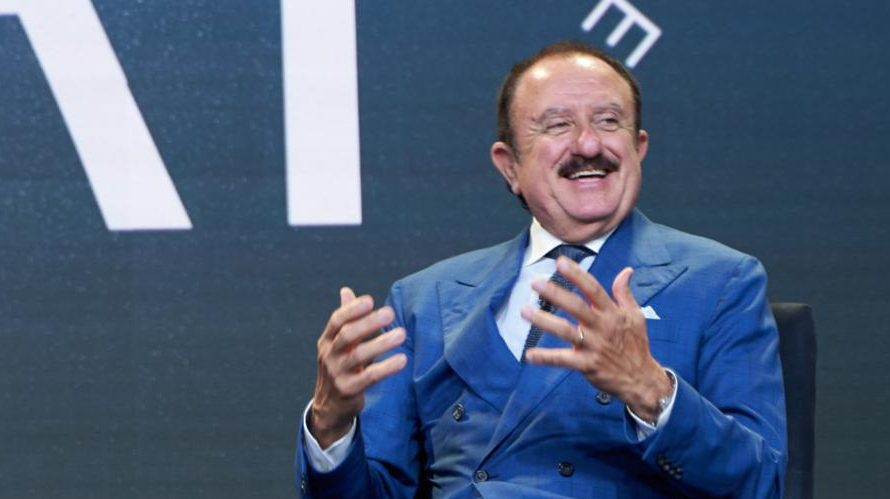
September 10, 2020
Smashing The ‘Cristal Techo’ (Glass Ceiling) For Millions Of Latinos
How Sol Trujillo is changing the landscape of corporate America.
-
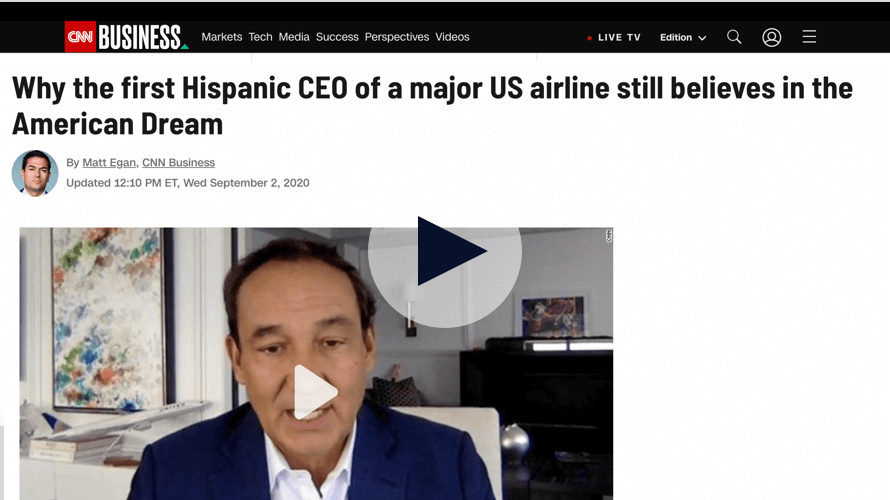
September 9, 2020
Oscar Muñoz On the American Dream and the Importance of Latino Representation on Corporate Boards
“When we attack, criticize and make fun of cohorts creating growth, as a businessperson, I say that’s illogical,” said Sol Trujillo, a former media and telecom CEO who later co-founded L’ATTITUDE. “The crown jewel we have in the economy today is the Latino cohort because they are so young.”
-

September 9, 2020
L’ATTITUDE Conference: Latinos Are America’s Hope Post COVID
Sol Trujillo, the first Latino CEO of an American Fortune 150 company, and celebrated musical artist Emilio Estefan, finalize details for the 2020 L'ATTITUDE conference
-

September 9, 2020
Build a “Can-Do” Culture
I am a strong believer in the axiom that “action is character” – that we come to know by doing, that we learn by doing. That’s why I believe it is essential first to act out or model the new culture you want to nurture. For our customer-facing employees – especially technicians and sales people – we always institute what I call the “do it now; do it right” approach. At Telstra I called it the One Factory approach, and it was driven by four guiding principles that Greg Winn, our chief operating officer, used to manage operations: Do it once; Do it ‘right’ for the customer; Do it in an integrated way; and Do it at the lowest unit cost. The culture of a large organization is best changed by simple guidelines, easy-to-understand expectations, and people at every level who day-after-day model the ideas, attitudes, and practices by which the new culture will be defined. At Telstra we delayed the formal introduction of a more customer-centric, family-friendly, entrepreneurial, flexible, and results-oriented culture until late in the first year of our transformation. However, we began on Day One to model the new culture. We began by doing what we said and saying what we would do. As we performed our reviews, we told the unvarnished truth with a no-spin approach. We walked our talk. As a result, employees and many outsiders saw that we were serious, that the leaders were leading. We modeled the new culture for nearly a year so that we could embed these values and priorities in key segments of the business and key teams and then model, spotlight, and amplify the new attitudes and practices before their formal introduction. When the time came, we introduced easy-to-understand monikers that captured the essence of the desired cultural transformation. These included a formatted collection of phrases, such as: Customer First Anything Possible Done Now Changing a culture is hard work, but it’s essential to changing the performance of an enterprise. At Telstra we were fortunate to have employee engagement surveys that went back several years prior to our transformation, so we were able to have reliable “before-and-after” measures of employee attitudes and practices. The changes we achieved were dramatic as most of the indicators registered increases from the high teens in some cases to the high 80s and low 90s and substantial improvements on literally every measure – including employee engagem.
-

September 2, 2020
Why the first Hispanic CEO of a major US airline still believes in the American Dream
"When we attack, criticize and make fun of cohorts creating growth, as a businessperson, I say that's illogical," said Sol Trujillo, a former media and telecom CEO who later co-founded L'ATTITUDE.
-

August 20, 2020
HBO Maxs ‘HA Comedy Festival’ Showcases Latinx Talent, Lupe Ontiveros’ Parting Shot
The festival and the HBO Max special are important building blocks for New Cadence Productions, the cotent venture launched last year by veteran writer-producer Jeff Valdez and several partners, including former U.S. West CEO Sol Trujillo.
-
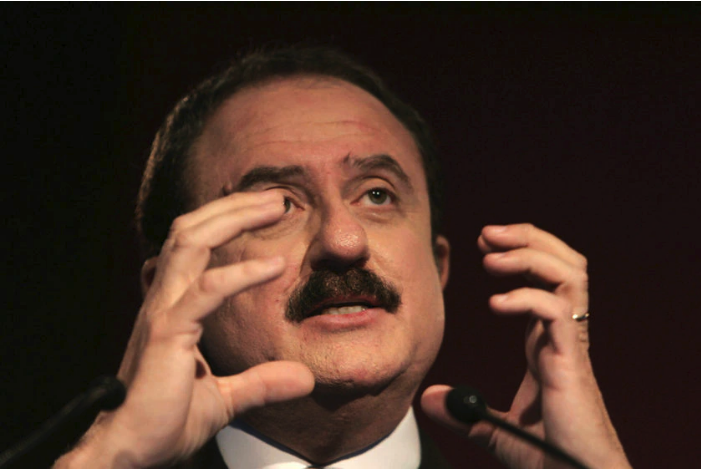
August 16, 2020
NBN missed almost every mark, but there is a chance for the Government to avoid total failure
The question is, can it be saved and made into a useful piece of equipment to power the economy into the future? The answer to that is, quite possibly, yes.
-

February 20, 2020
Cuban multi-time Grammy award winner and entrepreneur Emilio Estefan joins efforts of L’ATTITUDE
L’ATTITUDE, the business-based national initiative focused on discussing the Latino impact on the U.S. economy
-

January 24, 2020
HA FESTIVAL Celebrating the Art of Comedy is Coming to San Antonio for Three Days in February
Principals of NCP (New Cadence Productions) and executive producers of the HA Festival, Jeff Valdez, Sol Trujillo, Bruce Barshop and Vince Cordero recently signed a first look deal with WarnerMedia Entertainment.
-
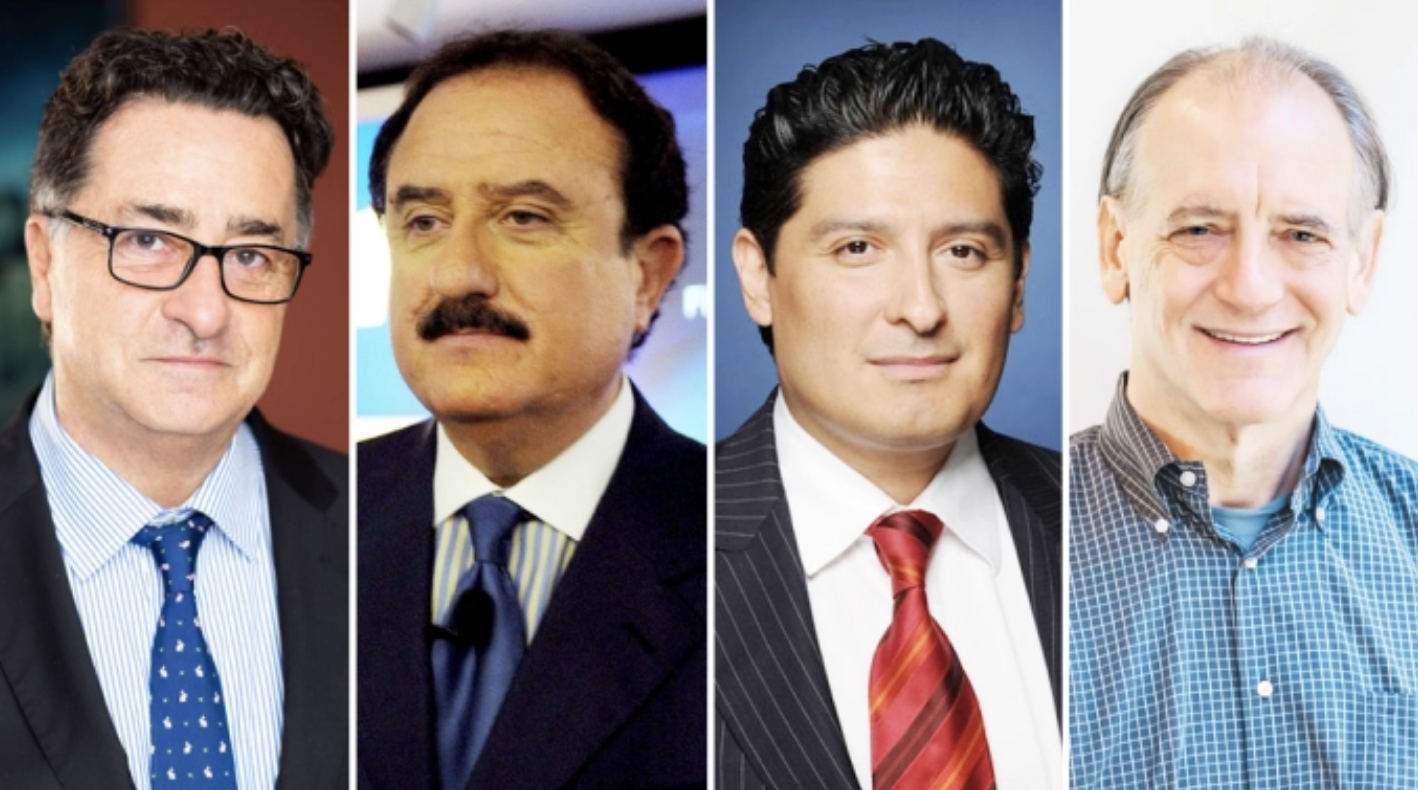
September 26, 2019
New Cadence Productions Sets Development Pact With WarnerMedia for Comedy Specials, Series
New Cadence Productions has set a first-look development pact with WarnerMedia to produce comedy specials and to develop a series for WarnerMedia platforms.
-
September 26, 2019
Sol Trujillo Op-Ed on the Powerful Facts and Data of US Latino Economic Contribution
-

September 24, 2019
Differentiate
A business wins through differentiation in all its functions: the customer experience, products and services, value proposition, and human performance (not the least during assessment and evaluation time). Some examples of differentiation in action include: At USW and Telstra we introduced market-based management (MBM) that included massive research into the wants and needs of the consumer. In Australia, we conducted more than 400,000 interviews so that we could understand consumer needs, desires, experiences, and expectations. At Telstra we established more than 50 consumer, business, and wholesale market segments that were linked to every other part of the business – from sales and customer care to product development – so we could respond with products and services tailored to the needs of identifiable market segments. At Telstra we established interactive retail stores where consumers could have a hands-on experience assisted by technology-savvy sales consultants who could help them see new possibilities for changing their lives by using our products and services. At US West and Telstra we established a performance management system, bringing discipline and rigor to the performance review process to spotlight merit and reward truly high-performance when it happened.
-

September 16, 2019
Robert Rodriguez, Zoe Saldana, Lin-Manuel Miranda Team for LATINXT List of Emerging Talent
“This is all about our economy. In the case of U.S. Latinos, they’re now generating over $2 trillion of GDP in our economy today,” says L’ATTITUDE co-founder Sol Trujillo.
-
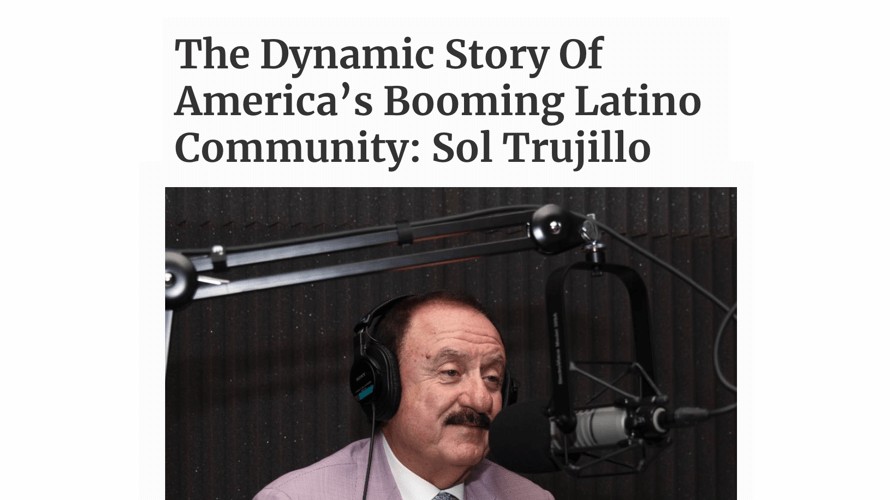
September 16, 2019
Sol Trujillo Discusses America’s Booming Latino Community with Steve Forbes
Born to a struggling family in Cheyenne, Wyoming, Sol Trujillo, chairman of the Latino Donor Collaborative, has achieved great success.
-

September 10, 2019
Invest To Win
It is important for a CEO and the Board to make investments that will generate competitive returns. Not a regulator’s definition of “fair” returns…or a competitor’s idea of “reasonable” returns…or a pundit’s “commercial” returns. If shareholders cannot earn competitive returns – returns that can be leveraged by a company’s position in a competitive environment – they will invest their money somewhere else. Winning can be measured in many ways – but I have always focused on four key areas: Winning for shareholders, including competitive returns measured by total shareholder return; Winning customers, indicated by metrics such as increased market share; Winning financials, especially growing revenues, EBITDA and free cash flow; and Winning the loyalty and commitment of employees at every level, measured by everything from recruitment and retention indicators to independent and periodic assessments of employee satisfaction. Some of the ways to achieve a competitive edge include: Seek premium prices for truly differentiated premium products and services – as we did at Telstra with our world-leading NextG™ mobile Internet. Employ value-based pricing where you provide value-added service in the form of bigger, better, faster, simpler, more integrated, more timely, more accessible, more useful and where the customer is willing to pay more for value. Be quick to evaluate base prices as the competitive environment changes owing to new entrants, new technologies, changing consumer preferences, or other factors. Establish a culture that encourages and rewards initiative and innovation by employees at every level – including formal training, formal and informal coaching, on-the-job mentoring on a continuing basis and pay-for-performance.
-

September 10, 2019
Zoe Saldana, the Estefans and Other Latino Celebtrities Feature at L’ATTITUDE
The founders behind the concept are Solomon ‘Sol’ Trujillo and Gary Acosta, who spoke with HOLA! USA about Latino entrepreneurship and how they play a major role in the new economic world.
-

September 1, 2019
Sol Trujillo Joins CNBC to Discuss the Massive Impact of US Latinos on the New American Economy
L'ATTITUDE Founder Sol Trujillo joins Squawk Box on CNBC to share insights on the US Latino GDP and the importance of the L'ATTITUDE event for promoting the Latino effect on the New Mainstream Economy.
-
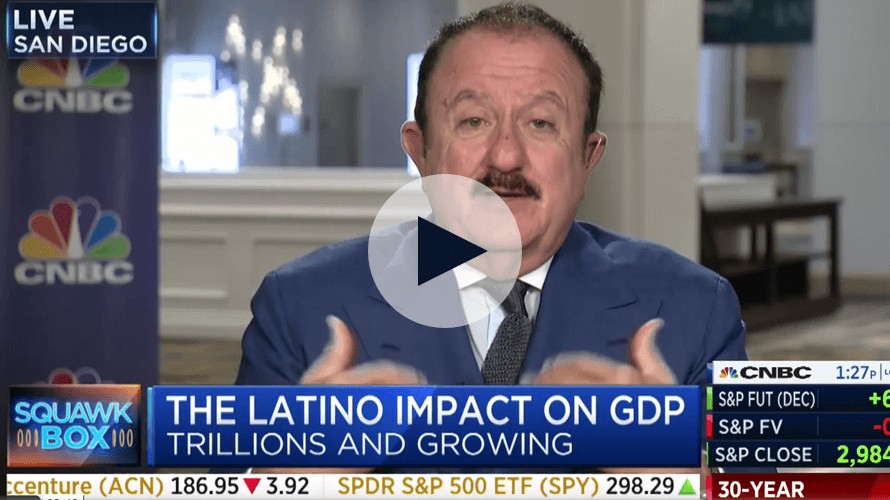
September 1, 2019
Sol Trujillo Joins CNBC to Discuss the Massive Impact of US Latinos on the New American Economy
-

August 30, 2019
Focus On The Customer Experience
Focusing on the customer experience requires putting the customer at the center of everything you do, adding new dimensions to the old idea of customer-centric management. Focusing on the customer experience means that we have to look at every element and every stage of the customer’s contact with our people, systems, and processes: the retail spaces where they shop, our products and services, the experience with our service reps, and their experience with billing – with every touch point we have with the customer. At US West and Telstra we invested several hundred million dollars to establish a fully-staffed Learning Academy to provide formal training for our thousands of technicians. The Learning Academy is a place where customer-facing service staff can hone their technical skills, improve their interpersonal skills, and keep up with new technologies and new product, process, and method innovations. At Orange we developed and tested new approaches to retailing, moving from selling devices to market-based management (MBM), a relationship around coaching and training customers, and providing consulting services where we could solve customer’s problems, watch the customer experience around our products and services, and listen to customer needs. The result at Orange was increased growth rates from less than four percent when we introduced MBM to double-digit growth 12 months later. At Telstra we designed and deployed state-of-the-art, interactive retail stores where consumers could have a hands-on experience with our products and talk with technology-savvy sales consultants who could help them see new possibilities for changing their lives by using our products and services. The result at Telstra was that sales in our state-of-the-art stores exceeded sales in traditional retail outlets by more than 30 percent. At Telstra we deployed a high-speed, nationwide mobile Internet with world-leading network speeds, more reliable service (e.g., fewer dropped calls), more choices in how a mobile phone or personal digital assistant (Smartphone) can be used (including live TV, browsing, as a hot spot), and more choices in how and where the services could be accessed.
-
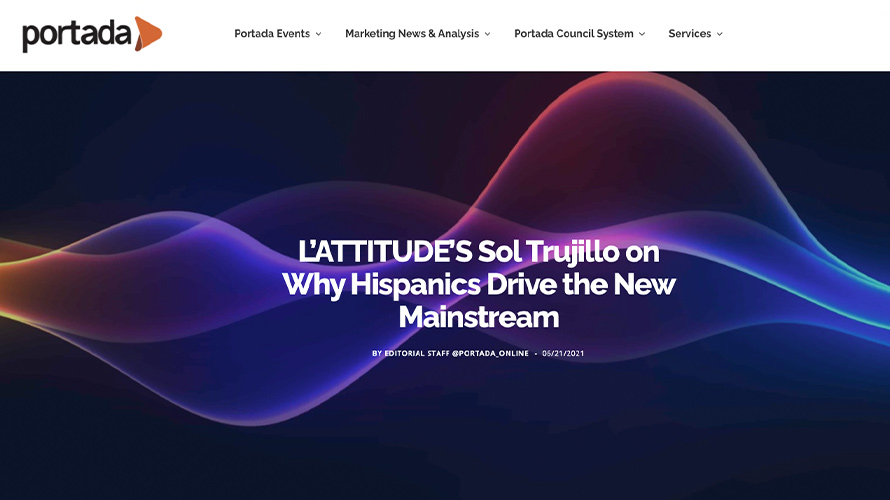
June 12, 2019
L’ATTITUDE’S Sol Trujillo on Why Hispanics Drive the New Mainstream
The Hispanic Market has become the New Mainstream. Due to their enormous contribution to workforce and consumption growth “Latinos play a crucial role in the new Mainstream Economy”, Sol Trujillo, Co-Founder L’ATTITUDE tells Portada. The key role of Latinos in the present and future of the multicultural U.S. economy will be discussed at the L’ATTITUDE Conference in San Diego from September 29 to October 2, 2021.
-

May 29, 2019
TasmaNet names Elizabeth Aris CEO
Aris has also worked with a small team of global telecommunication experts led by Sol Trujillo on a number of major projects and was an adviser to the CEO of Sprint, according to TasmaNet.
-

February 20, 2019
Hispanic Executive Conversations at the Top: Strength Through Adversity
On the final installment of the Hispanic Executive three-part video series, Sol Trujillo talks about the work ethic his parents instilled in him and about dreaming big. He advises the next generation to be aspirational and to avoid limiting themselves in boundaries.
-
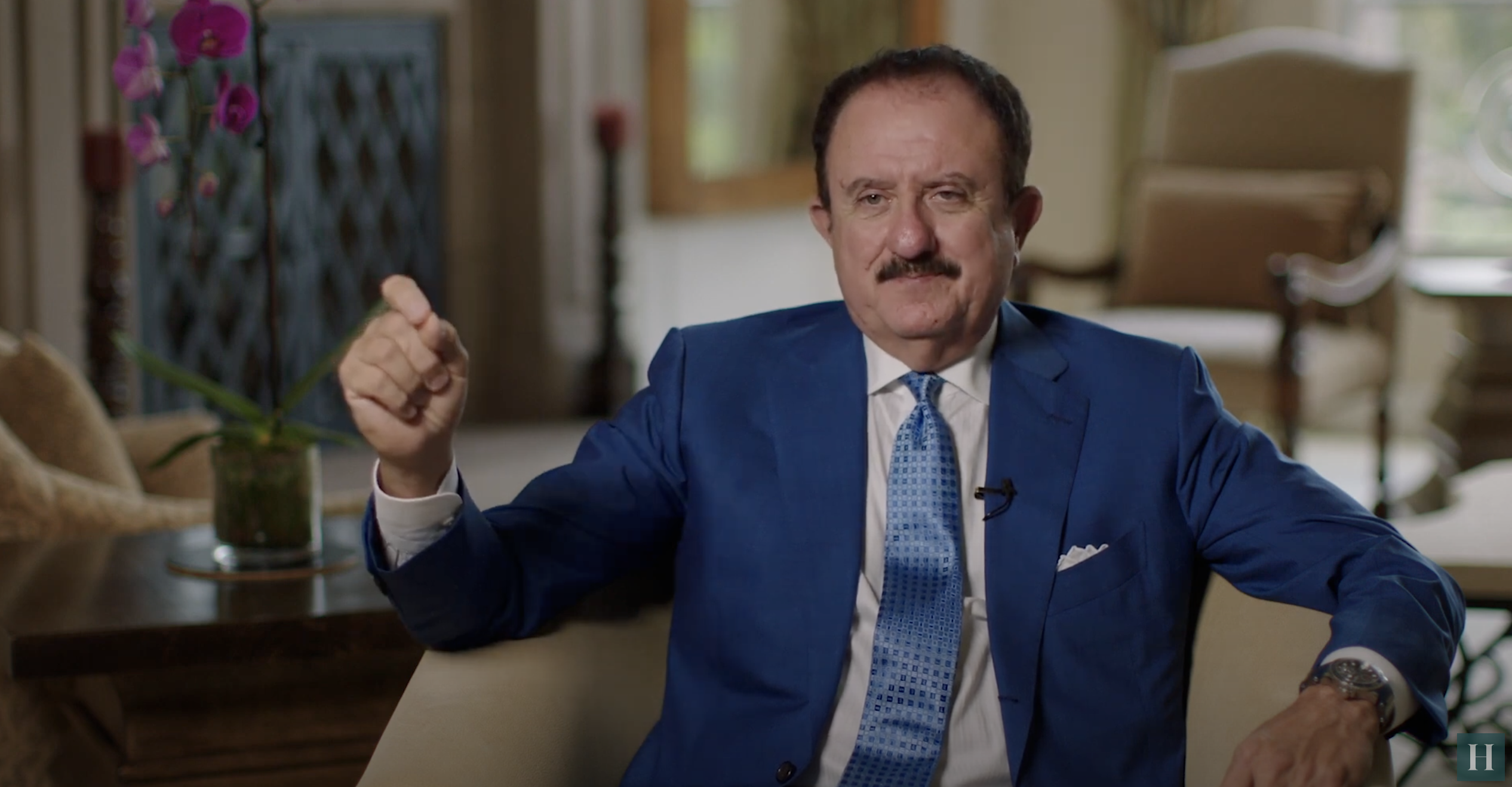
January 15, 2019
Hispanic Executive Conversations at the Top: Cultural Identity
Part two of the Hispanic Executive three-part video series discusses the rising influence of US Latinos and how to change cultural perception.
-

December 11, 2018
Hispanic Executive Conversations at the Top: On Greatness
In part one of the Hispanic Executive three-part video series, legendary businessman and star of Issue 1, 2019 cover, Sol Trujillo, talks about establishing a path to greatness.
-
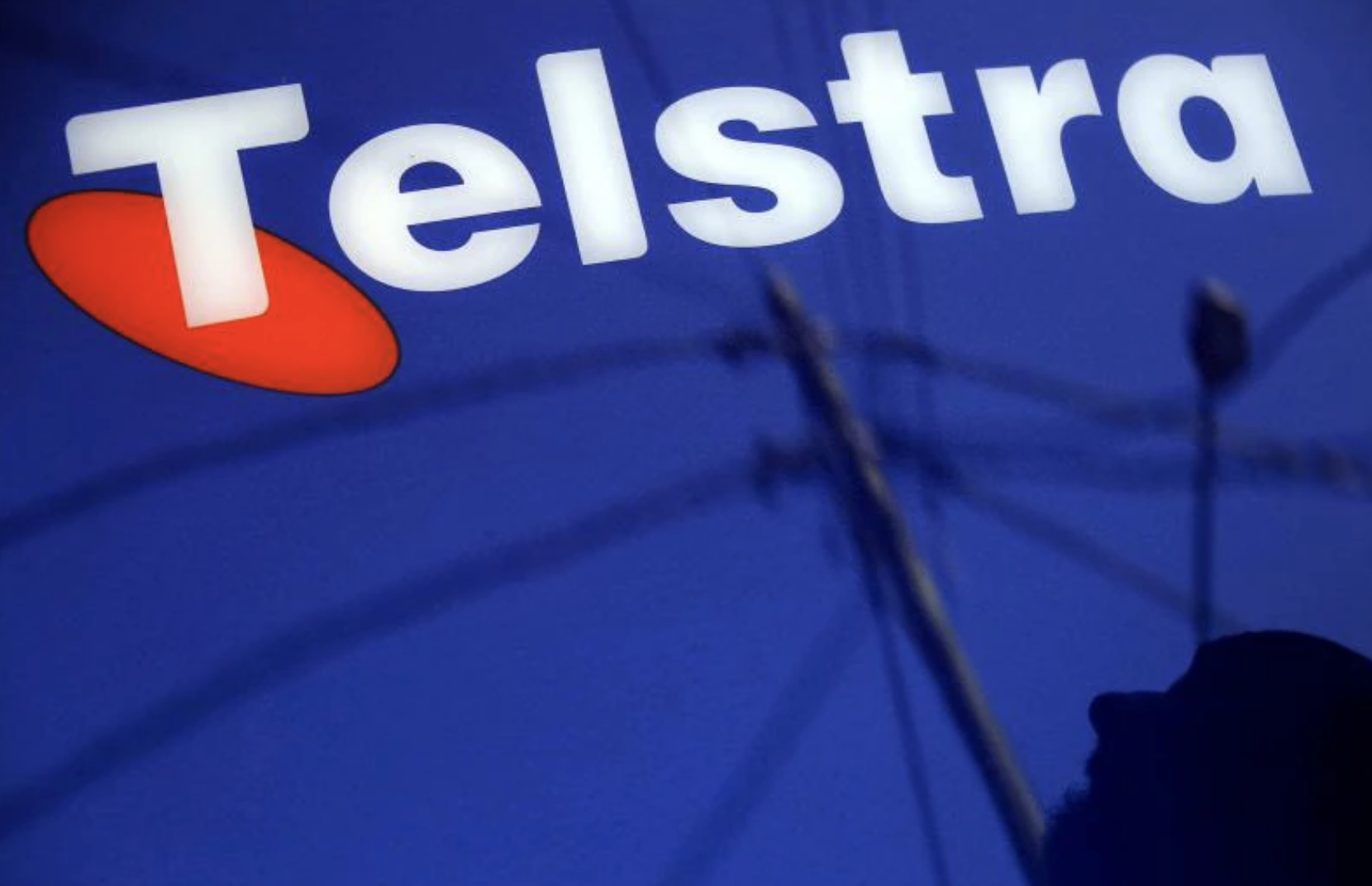
October 16, 2018
Telstra’s board may be angry about the protest vote, but they have only themselves to blame
Despite Telstra's share price tumbling 40pc last year as profit and dividends also fell, John Mullen told shareholders it wasn't a poor performance.
-
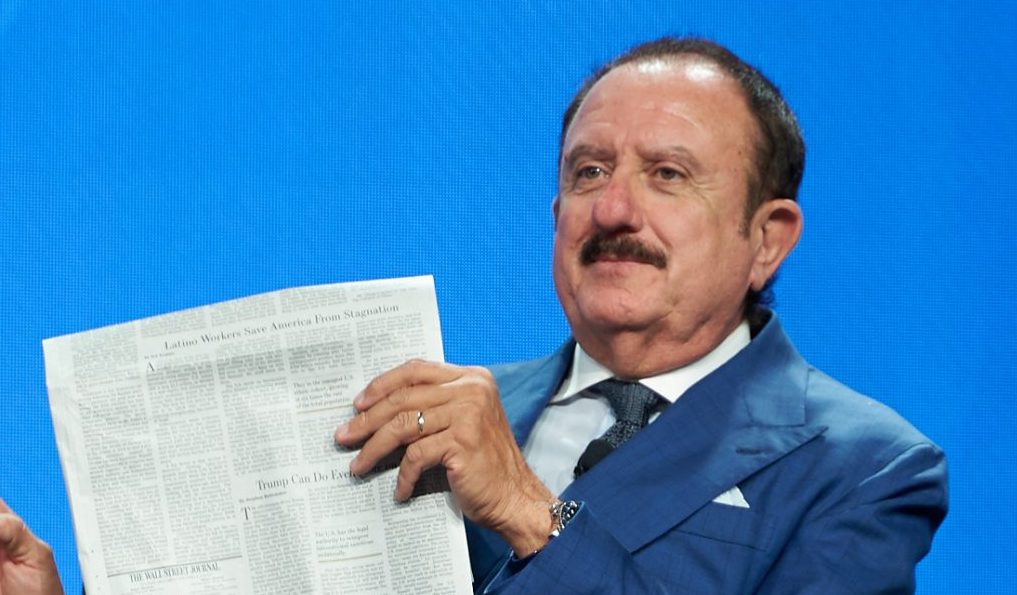
August 29, 2018
The ¨Latino Factor¨ Will Save America’s Economy
Baby boomers are aging out of the workforce—but this demographic is younger and growing.
-

June 12, 2018
Unlockd advertising start-up blames Google as it goes into voluntary administration
It was planning to list on the ASX, and had financial backing from the likes of Lachlan Murdoch, former Telstra boss Sol Trujillo, and Seven Group's former managing director Peter Gammell.
-
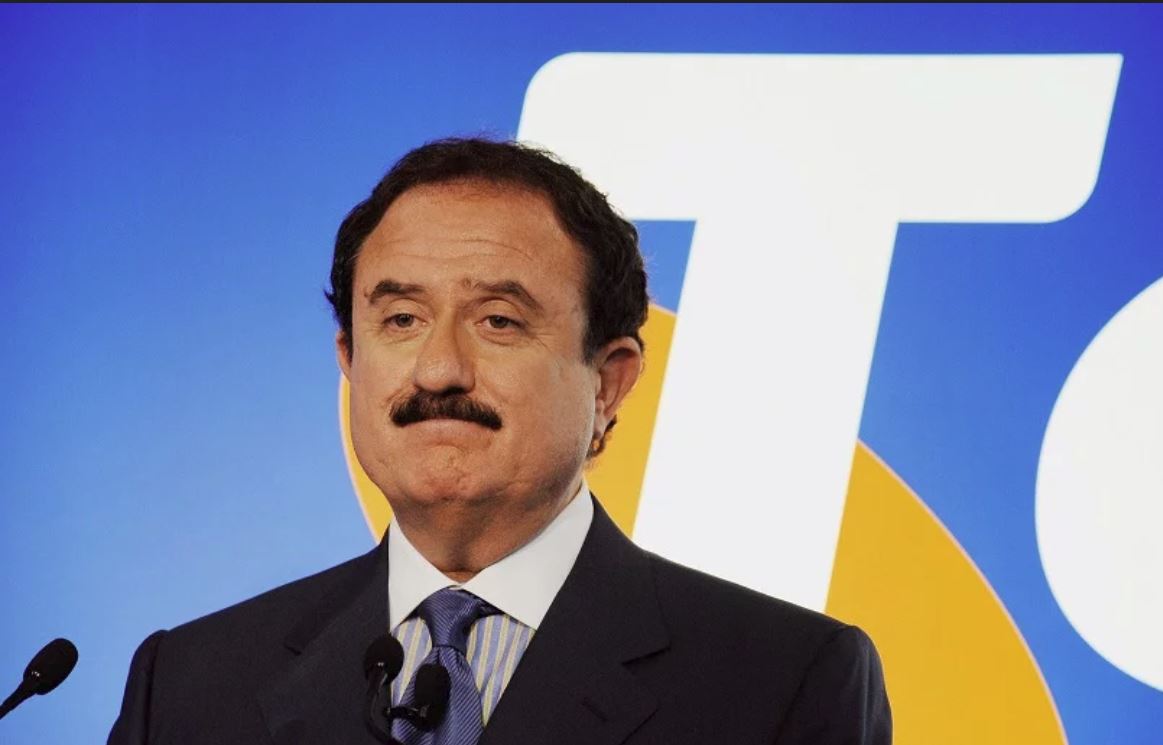
May 31, 2018
Telstra, Is It Time To Bring Back Sol Trujillo and The Three Amigo’s
Telstra is a mess, and the man whose head could be on the chopping block is CEO Andy Penn who is definitely no Sol Trujillo.
-

April 17, 2018
WPP hires recruitment firm to help find Martin Sorrell successor
The board member Sol Trujillo, a former chief of companies including the French telecoms firm Orange and Australia’s Telstra, is understood to have been one of the most vocal about the issue of succession at WPP.
-

April 4, 2018
Who are WPP’s board of directors?
Solomon D Trujillo was appointed a director of WPP on 12 October 2010.
-

July 1, 2017
Lead From The Front
A leader must lead from the front and not from the sidelines. True leaders provide clear direction and then take the first steps down the chosen path. From the senior team and other senior executives to the program manager and the technician, employees at every level must have intimate knowledge of the CEO’s vision and objectives for the enterprise. The ancient texts said it best: “If the trumpet makes an uncertain sound, who will listen?” At Telstra, for example, our vision was “To change the game by delivering a differentiated customer experience that is simple, integrated, intuitive, and fast.” That vision focused our attention on the customer experience. It was about putting the customer at the center of how we organized ourselves and how we operated to deliver products and services that reflected needs-based segmentation. The customer experience – not a product, system, technology, or network – was at the center. Our vision was about developing a new business model around media-communications, and this vision required an end-to-end transformation. There were alternatives to this approach. There were political as well as business pressures for Telstra to spin off its directories business or its cable TV business. We could have stemmed the bleeding short-term by patching up old networks. We could have made selective investments in new technologies or overseas. But we didn’t. Our vision was to serve Australia’s people and its cultural and commercial interests by building a game-changing media-communications business. The requirements we laid out were the following: A telco with next generation networks; A telco with integrated businesses and services; and, ultimately, The world’s first fully-integrated media-comms business that could give consumers and enterprises access to services that would be simple, integrated, intuitive, and fast. Providing clear direction is achieved by sound planning, an inspiring vision, and the effective communication of that vision to employees, shareholders, and the public. However, vision and planning must be coupled with timely and effective execution, with translating words into deeds, and with making things happen that give life to the vision. Execution according to a plan is essential, but execution that can adjust in real time to changing circumstances in vendor relations, the marketplace, or other elements of the business environment is what separates winners from losers. I use a social technology I call the “Program Office” to make sure that complex management interventions are delivered on time, on budget, work as they should, and are fixed when they don’t. At Telstra, the Program Office was used to chart progress, provide clear visibility to the status of transformation milestones, and to focus extra management talent and technical skills where necessary to put things back on track. I used the Program Office, which included a team of 30 senior managers with many and varied talents and skills, so I could make sure the trains ran on time in a company where we began with 52,705 employees who were seeking leadership and took full advantage of assistance to make things work – to fix the networks, product development, customer care, and everything else that needed re-engineering to make sure we delivered on our promises.
-

May 12, 2017
Graduation 2017: Whittier College students get diplomas, hear local success stories
Family and friends gathered at Memorial Stadium, and along with the graduates, trustees and faculty, listened to speeches by keynote speaker Sol Trujillo, student speaker Kourtney Brodnax and President Sharon Herzberger.
-
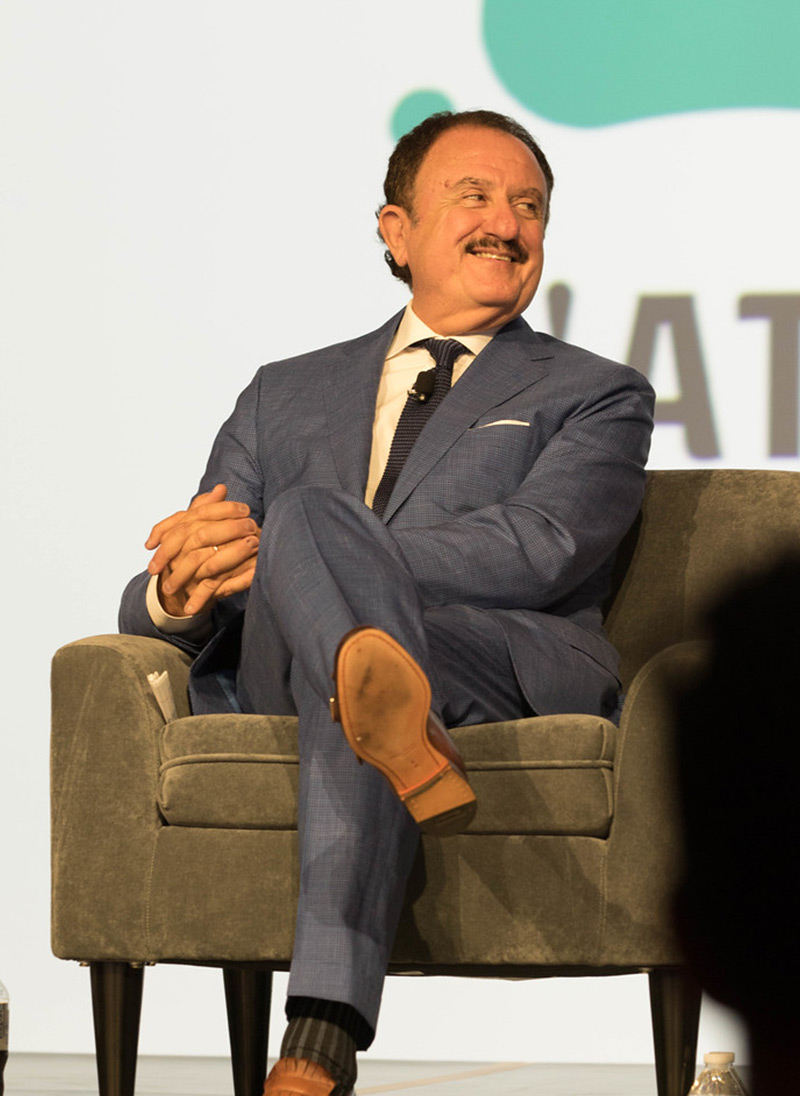
September 5, 2016
People to Watch in International Business
Melbourne-based Telstra's new CEO, Sol Trujillo, 53, will need to steer the telecom giant through some daunting challenges, namely Parliament, privatization and protocol.
-
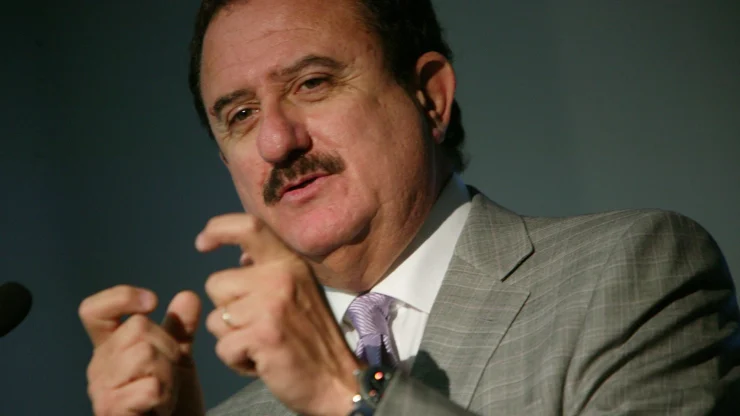
July 19, 2016
Unlockd: the mobile disrupter that lured Sol Trujillo back to corporate Australia
Trujillo became a non-executive director of Australian start-up Unlockd, a mobile phone business that rewards users with discounted plans and phone credit in return for watching ads and sponsored content.
-
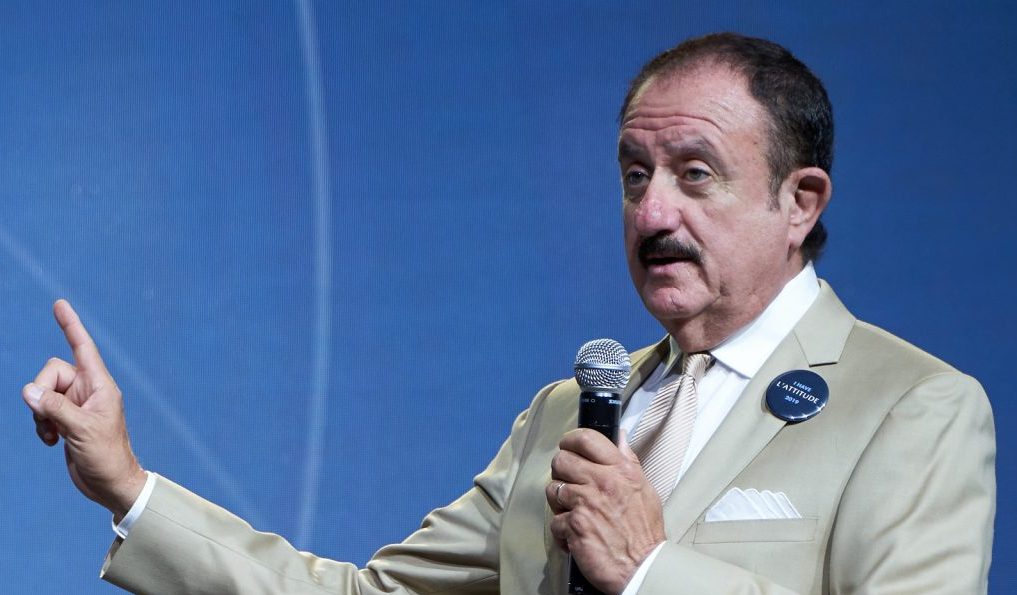
June 17, 2016
U.S. Manufacturing Success Requires Policy Changes
Despite our success, it is true that the U.S. has serious challenges in manufacturing. For example, in 2000,China replaced the U.S. as the world’s second leading exporter, with the EU as number one. Today, America’s global market share of manufactured exports ranks third (as opposed to total manufacturing, where we still rank first) because our export share has declined from 19 percent in 2000 to less than 14 percent. Still, during this period, the absolute dollar value of manufactured exports has steadily increased, though less rapidly than exports from China, India and Southeast Asia. A healthy manufacturing sector requires policy changes at every level. As global economic competition heats up, we as a country need to do the following to stay competitive: Improve K-12 education, Reform higher education by expanding access and decreasing costs, Increase private sector R&D investment, Upgrade transportation and telecommunications infrastructure, Expand the use of advanced information technologies in every sector, Reform our immigration laws to make it easy for highly-talented and high-work ethic immigrants to come to the US to improve their lives and ours, and Contain federal, state and local governments from increasing taxes and expanding regulations in ways that dampen investment, kill jobs, stunt innovation and slow economic growth. More generally, we need pro-growth and pro-investment policies at every level of government – policies that reduce trade barriers, simplify taxes, advance competitive tax and regulatory policies, encourage R&D and pay more attention to improving education, immigration and related talent development and workforce issues. That’s how we continue to be pace-setters in manufacturing. And that is how we will continue to lead in creating jobs in other sectors as well. Regardless of the system of economic classification we use to define manufacturing, we cannot forget that in theNew Economy advanced sales and distribution systems (such as Amazon.com or FedEx) and innovative retailing (such as Wal-Mart or Target) or advanced business services (devices, software, cloud computing, mobile internet) create good jobs at good wages and contribute mightily to wealth creation, as enterprises in every sector embed new information and networking technologies to specialize and integrate simultaneously and to win by becoming fast, flexible, focused, networked and global.
-
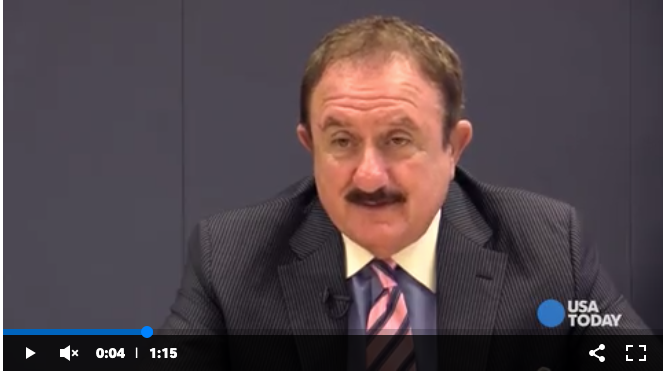
June 4, 2016
Why these Hispanic leaders think Trump is ‘bad for our country’
Sol Trujillo, a Republican businessman from California, and Henry Cisneros, a former secretary of Housing and Urban Development under President Clinton, said it's too late for Trump to turn things around.
-

May 29, 2016
Campaign Reveals Ethnic Conflicts
But political rhetoric feeds on unfounded myths about minority contributions to American society, said Sol Trujillo, founder and president of the Latino Donor Collaborative.
-

May 28, 2016
Presidential race shows deep-seated strife toward minorities
But the political rhetoric is feeding into misplaced myths about the contributions of minorities to this society, said Sol Trujillo, founder and chair of the Latino Donor Collaborative.
-
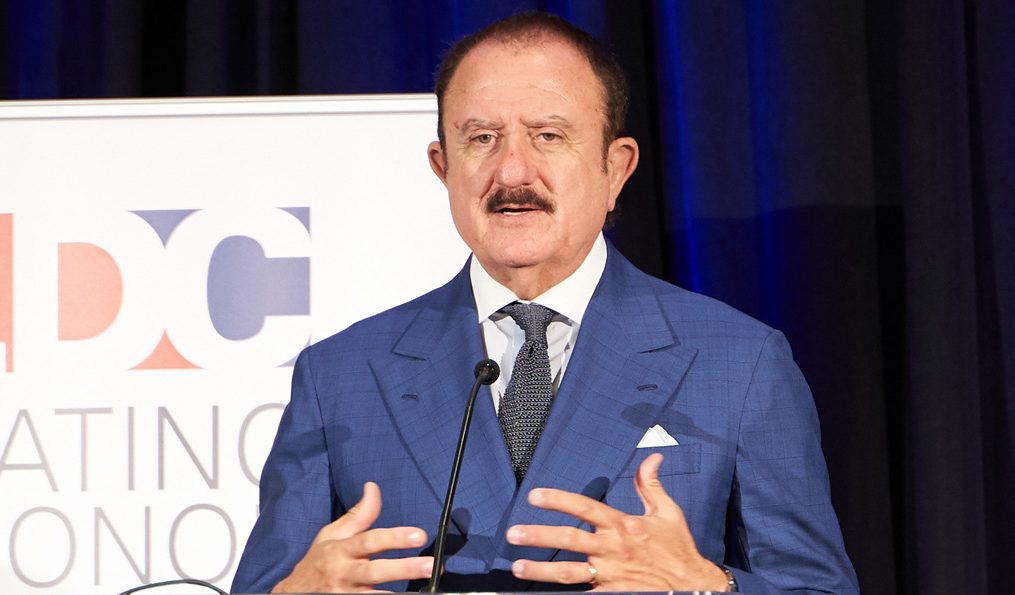
May 16, 2016
The Economic—and Demographic—Case for Immigration Reform
Since the November election, there has been much talk in Washington and on the pundit circuit about America's changing demographics, especially the "Latino vote" and the new realities of political campaigning. There has also been considerable wrangling over immigration and what it means for a country that is a nation of immigrants but is more crowded than it once was. The immigration debate is significant to America's politics and culture, but it is also crucial to the country's economics, a subject that receives too little attention. Let's be blunt: The future wealth and well-being of the American people—the country's economic security, national security, business innovation, GDP growth and status in the global marketplace—require a comprehensive solution to the chronic problems caused by a broken immigration policy. In particular, the status of 11 million unauthorized Latino immigrants now living here must be resolved. The economics are simple: Latinos spur demand. Seventy percent of the nation's gross domestic product is fueled by consumer spending. That means the Latino population—large, growing and increasingly prosperous—will play a key role in America's economic future. Latinos are now by far the country's biggest minority-market segment. Including unauthorized residents, the Latino population now exceeds 54 million (not counting nearly four million in Puerto Rico). Blacks, in second place, number 39 million. The Latino population has increased by more than 52% since 2000. In the same period, the non-Latino white population grew less than 2% and blacks by 14%. According to U.S. Census forecasts, the Latino population in America will reach 133 million by 2050. Those 133 million American Latinos will outnumber the populations of Japan and Russia, whose numbers are already in decline. With growing numbers comes more spending: Latino purchasing power now exceeds $1.2 trillion and, according to the University of Georgia's Selig Center, will top $1.5 trillion by 2015. From a global perspective, that means America's Latino market would be the 11th-largest economy in the world—just below France, Italy and Mexico, and above South Korea, Spain and Indonesia. At $20,400 per capita, Latino America's purchasing power already exceeds the GDP per capita of all four BRIC countries—Brazil, Russia, India and China. But Latinos' beneficial economic effect is hardly restricted to the demand side. A vital element of supply-side health is labor—workers, from the most talented who invent new products or start a business, to those just beginning to climb the ladder of self-improvement, whether through formal education or on-the-job training. Nearly one in six American workers (16%) is Latino, with nearly 23 million Latinos in the U.S. holding jobs. You might not know it from media coverage of immigration issues, but Latinos have the highest labor-force participation rate (nearly 67%) of any American demographic group. Slightly more than a quarter of children in the U.S. under age 18 are Latino. Based on existing trends, at least 1.1 million Latino youths will turn 18 each year for the next 20 years. Politicians may see 1.1 million new voters a year, but business owners see 1.1 million new workers with a strong work ethic. Given the aging of the country's baby boom generation—retiring at the rate of 10,000 a day for the next 18 years—the strength of the economy is increasingly linked to the promise of these younger workers. Dire demographics threaten the economies in many developed nations, and the U.S. is not immune to the challenges posed by an aging population. But the problem will be considerably mitigated by immigrants who revitalize the workforce. The average later-life American, whose life expectancy nearly doubled during the 20th century, is already asking: Who is going to pay for the Social Security and Medicare promises of the federal government? The answer: America's expanding, youthful immigrant population—another reason why ensuring educational opportunities at every level for all residents is in the national interest. Getting the U.S. economy moving again requires action on many fronts: tax and regulatory reform, new approaches to energy, education and health care. But nothing is more important than immigration reform. Despite the impression left by much of the rhetoric in Washington, immigration reform is not just about politics. It's about jobs, growth and competitiveness—economic security, which in turn means national security. To achieve these benefits, immigration policies and practices must be attuned to welcoming hardworking immigrants and to dealing fairly and smartly with those who are already in the U.S. regardless of their legal status. Legal immigration, including a guest-worker program that will bolster American business productivity, should be expanded in an intelligent way that is pro-investment and pro-growth. U.S. borders need to be secured against further illegal immigration. Washington must send a clear signal—to the American people and to every level of government—that a coherent and enforceable immigration policy is in place and here to stay.
-

May 11, 2016
Shape The Future
Shaping the future requires you to know customer preferences, technology trends, and societal needs and where these preferences, trends, and needs are headed. I have always adhered to the Wayne Gretzky school of management, which teaches that you win not by skating to the puck, but by skating to where the puck is going to be. Here are some examples of that management principle in action: At US West, we were first to achieve commercial deployment of high-speed broadband (DSL) to the home, the first to deliver live TV over copper wires, and the first to achieve commercial delivery of live TV integrated with the Internet, wireline, and wireless applications. I took on the job of CEO of Graviton, a high-technology start-up, because I was attracted by the idea of leveraging wireless technologies and developing a new industry that I call “sensornetics.” “Sensornetics” is about using small, aspirin-sized sensors on machines and infrastructure that are, in turn, linked to the Internet to expand our capacity to manage buildings, automobiles, bridges, compressors, and other elements of the engineered world. Sensornetics is important because it is dramatically increasing productivity in every sector including public health and safety. At Telstra we deployed NextG™ – the world’s largest, fastest, and most advanced high-speed mobile Internet which now delivers voice, video, and data at network speeds up to 42 Mbps to major cities with up to 21 Mbps available to 99 percent of the population. At Telstra we spoke out fearlessly on behalf of Telstra shareholders and the public interest to stimulate and lead a public debate on the need to embed high-speed broadband in every home and business to advance innovation in every sector through online channels. During our time at Telstra, Australia achieved world-leading increases in broadband penetration – from 16 percent in 2005 to 62 percent in 2009.
-

April 13, 2016
CUP Honorees Share Lessons to Combat Racial and Gender Parity
Founder, Chairman and CEO of Vista Equity Partners Robert F. Smith received the Philanthropic Leadership Award, and Solomon ‘Sol’ Trujillo, chairman of Trujillo Group, LLC, was also honored with the Lifetime Leadership Award.
-

March 17, 2016
Dos inversionistas buscan participar en Red Compartida
The regulator specifies that on the Trucotech side, the visit was led by its CEO, Sol Trujillo, also president of García Trujillo, a consultancy that also acts as a merchant bank for companies in the United States and Latin America.
-

March 13, 2016
How Latinos Power the American Economy
The 2016 presidential race focuses on immigration as candidates and the media miss a much bigger story.
-
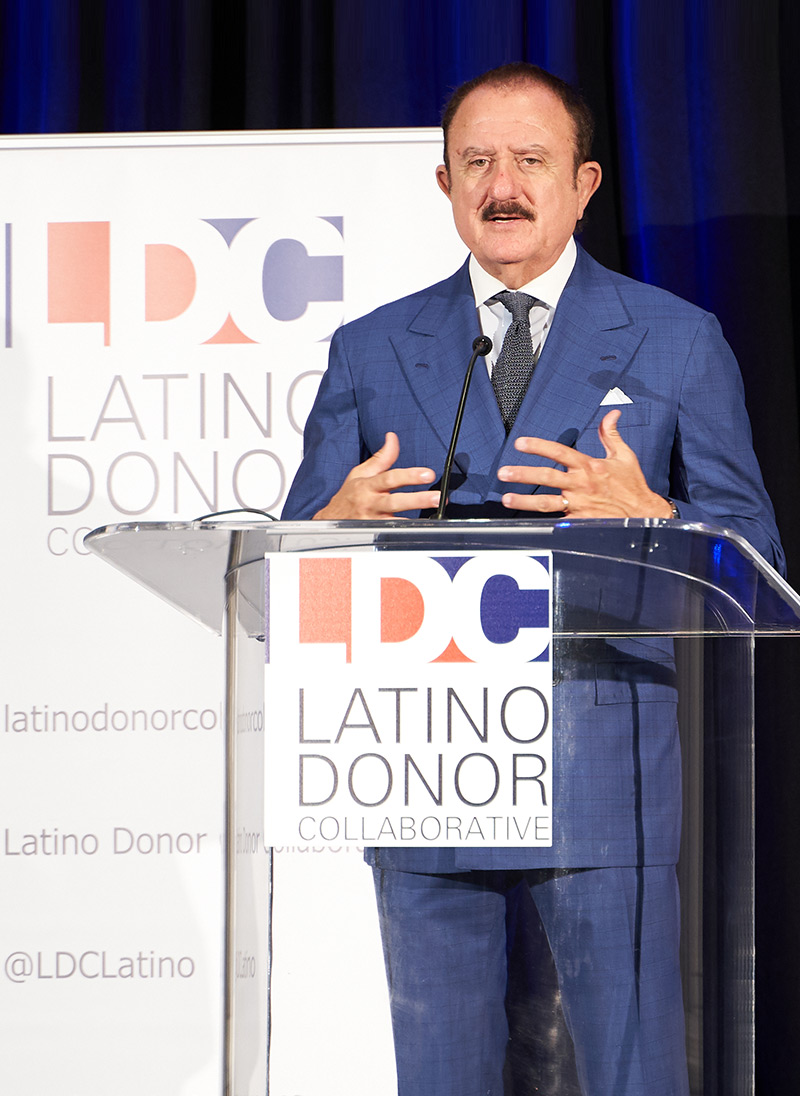
February 2, 2016
Politicians are wrong about Latinos
Commentary by Sol Trujillo, the co-chairman of the Latino Donor Collaborative, a non-partisan NGO focused on raising awareness of Latinos' contributions to the current and future success of the nation's economy and society
-
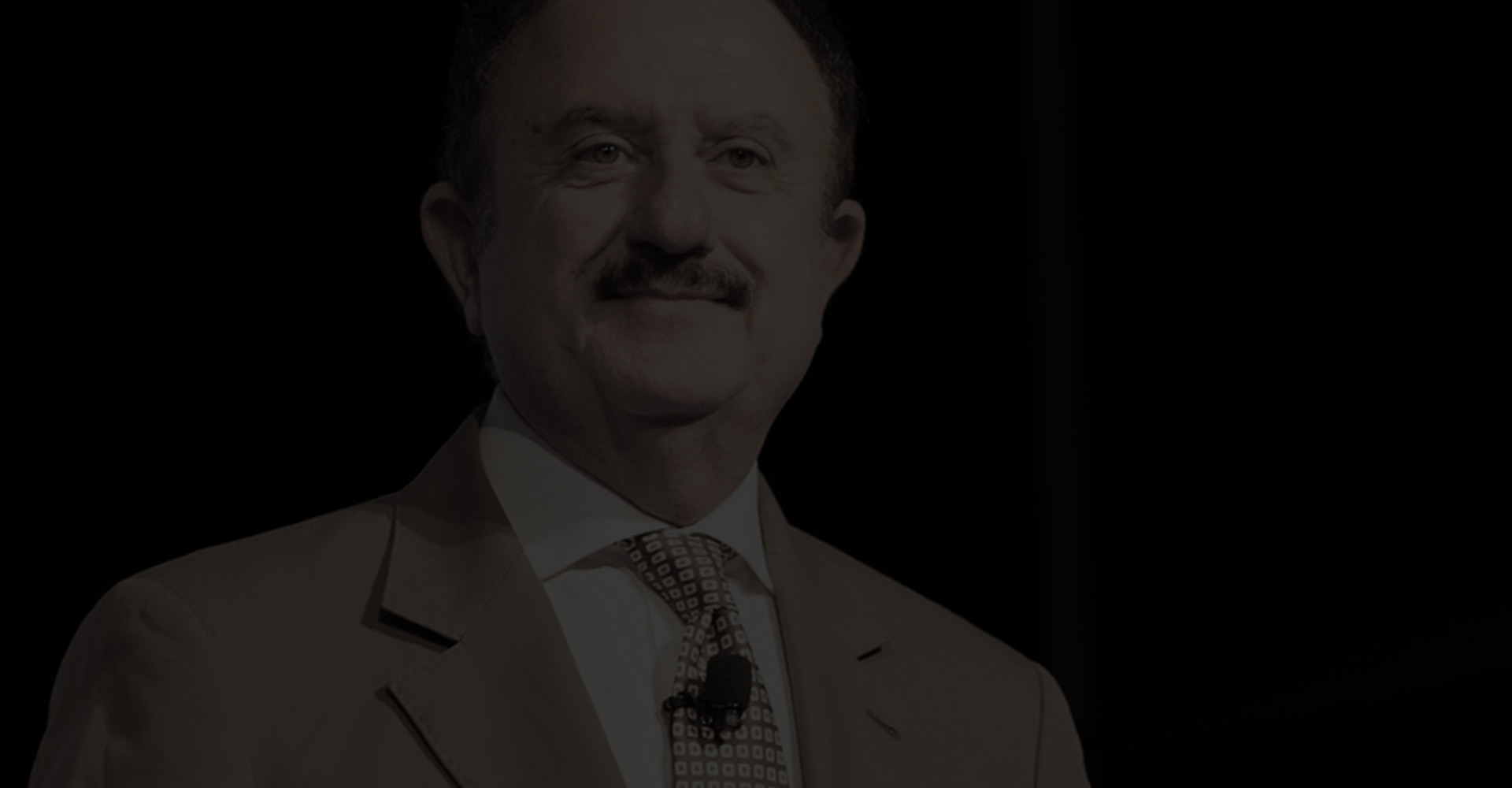
September 6, 2015
New Ingeñuity Media Company Aims to Showcase Latino Excellence
Motivated to share Latino success stories with a broader audience, Chavez teamed up with his wife Sarah Ruiz Chavez, who’s a Latina entrepreneur, and prominent international business executive Sol Trujillo to create INGEÑUITY.
-

June 19, 2014
‘Google Schmoogle’ – how Yellow Pages got it so wrong
In the world of the internet and e-commerce, the very notion of a book the size of two bricks being the source of valuable purchasing information seems plain silly.
-
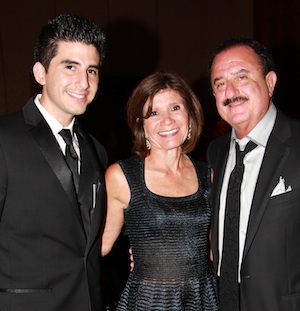
October 9, 2012
Hispanic 100 Honors ‘Actorvist’ Esai Morales
Hispanic 100’s first Mentor Program graduate, Robbie Munoz, left, greeted by guests Corine and Sol Trujillo.
-

January 1, 2012
Lessons of Leadership
Sol Trujillo is missing something. This is odd because in all the time we’ve been acquainted, I’ve not known him to miss much.
-
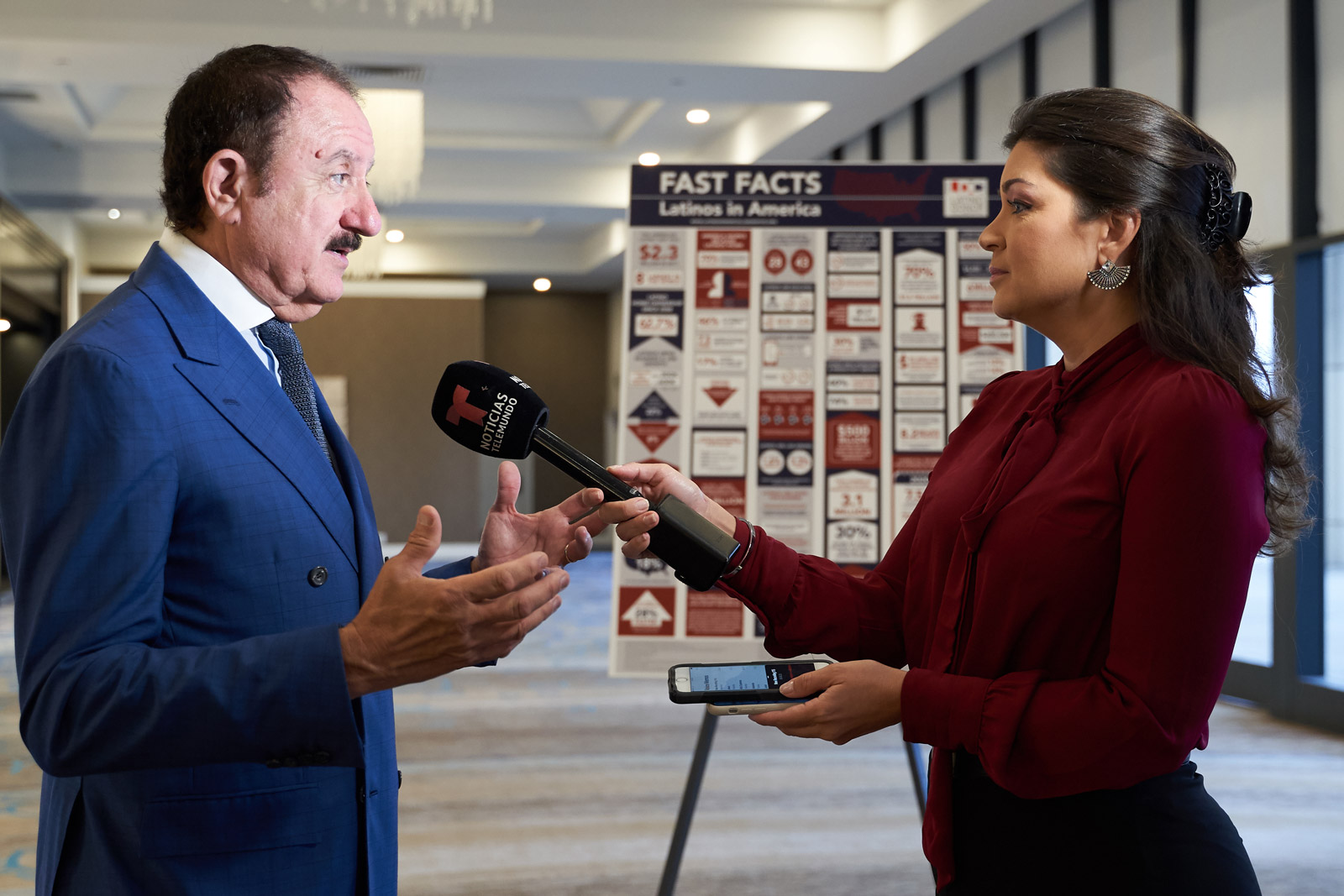
July 18, 2005
How Latinos Drive America’s Economic Growth
“You generally come [to the country] with fewer resources,” says Sol Trujillo, former CEO of Telstra, Orange and US West.


